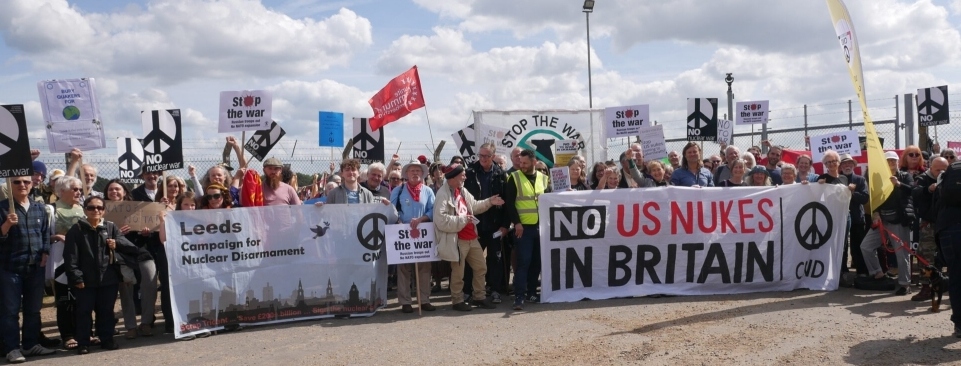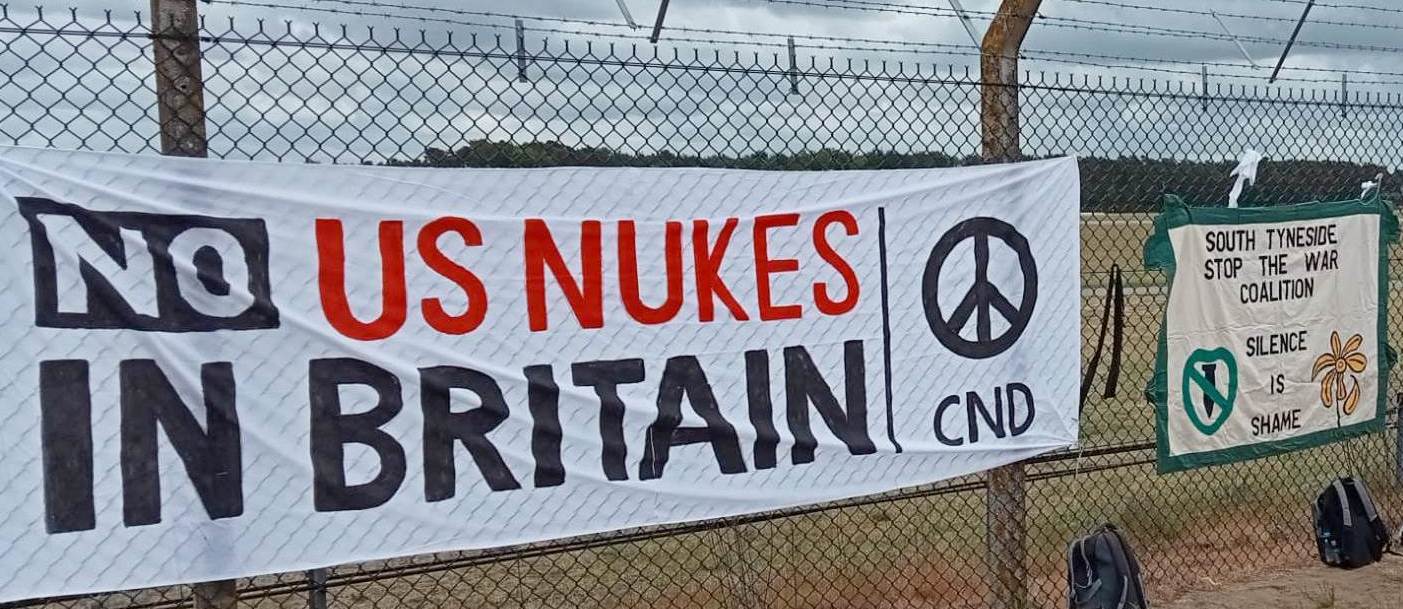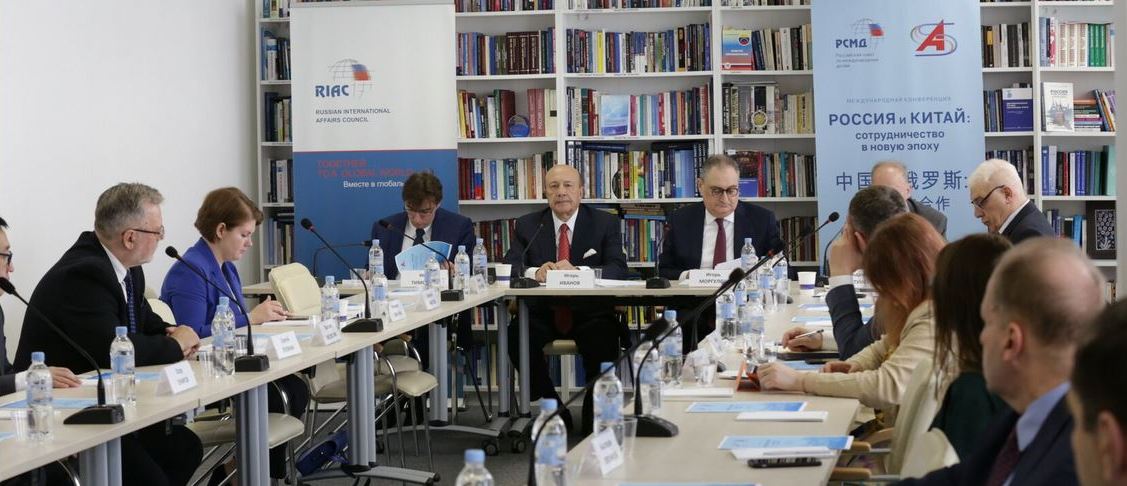No. 6
June 5, 2022
The Striving of the Peoples for a New World Order
• Today, Thinking Things Through Is More Necessary Than Ever
• Disinformation and a Modern World Outlook
U.S. Plans to Increase Domination and Control Over Europe and Asia
• Congress
Resolution Calls for Use of NATO for More Intervention
into Member States
• Kissinger
Addresses How the U.S. Should Proceed to
Order and Divide the World
• Conception of Total War to Order the World
• Lend-Lease Law
Strengthens Executive Authority at Home
and U.S. Control Over Europe
For Your Information
• Use of Lend-Lease in World War II
NATO's Immediate Plans
• NATO Meeting of Top Military Authorities
• Agenda of the NATO Summit in Madrid, June 28-30
• NATO's New Strategic Concept
People's Opposition to NATO
• Anti-War Protest in Britain Opposes Permitting
U.S. Nuclear
Weapons at RAF Lakenheath
• Declaration of People's Peace Summit, Madrid 2022
News, Views and Information on Unfolding Events
• Worrisome Statements About the Future of a Militarized Europe
• Seventh International Russia-China Conference
Discusses
"Cooperation in a New Era"
• U.S.
Sanctions Will Force Russia into Default on Foreign Debt Held
Mostly by U.S.
Investors
• What the U.S. and NATO Are Doing Violates International Law
• The Treaty on Security Guarantees that Russia Proposed to the U.S.
The Striving of the Peoples for a New World Order
Today, Thinking Things Through
Is More
Necessary Than Ever
As the world descends into an abyss of anarchy and violence as a result of the neo-liberal world order, every aspect of people's lives seems to be spinning out of their control. The U.S. and the big powers of Old Europe, with Canada in tow, imposed this neo-liberal world order after the collapse of the former Soviet Union in 1991.
A feature of the situation is that the practice and theory of liberal democratic institutions no longer function as means to sort out conflicts among rival factions at home or abroad, nor to maintain the legitimacy of their rule in the eyes of the people. At home, factions of the ruling elite resort to concentrating more and more powers in the hands of governing executives such as the Prime Minister's Office in Canada and Britain, or the Office of the President in the United States. Abroad, concentrations of power go by various names such as NATO, the G7, the Organization of Security and Cooperation in Europe (OSCE), the European Union (EU) and many others. Nowadays, they rule through dictate, not negotiations.
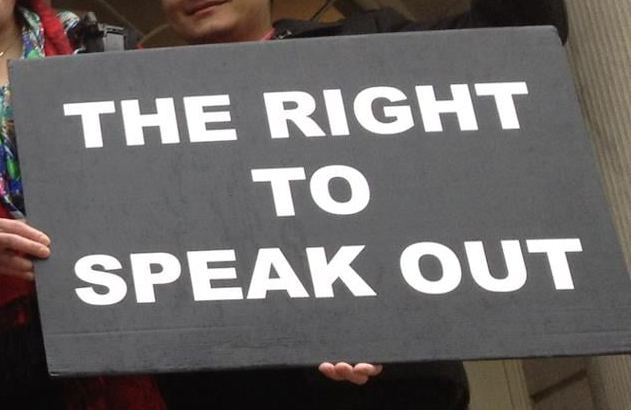 The
ruling elite impose their demands through decree to wreck nations and
wage wars of destruction. Politics no longer exists, replaced with rule
by decree, using executive orders and other prerogative police powers.
All forums where political discourse took place prior to the advent of
the
neo-liberal world order have been supplanted with rule by decree and
its corollary, the suppression of freedom of speech, conscience and
assembly. People are forced to fend for themselves and, as such, forced
to face the most important challenge of our time, the necessity to
forge a collective
consciousness that favours the peoples in opposition to the ruling
elite.
The
ruling elite impose their demands through decree to wreck nations and
wage wars of destruction. Politics no longer exists, replaced with rule
by decree, using executive orders and other prerogative police powers.
All forums where political discourse took place prior to the advent of
the
neo-liberal world order have been supplanted with rule by decree and
its corollary, the suppression of freedom of speech, conscience and
assembly. People are forced to fend for themselves and, as such, forced
to face the most important challenge of our time, the necessity to
forge a collective
consciousness that favours the peoples in opposition to the ruling
elite.
In this regard, an important feature of analyzing is not to confound the objective world with one's subjective impression of it. Rather than a reflection of the objective world and its concrete conditions, a subjective analysis can become an amalgam rendered through the prism of one's existing understanding from observing, reading and hearing.
For instance, people's thinking on the Ukraine conflict is all over the map. Some are persuaded that Russia is evil and its actions in Ukraine trump whatever crimes U.S./NATO has committed in the last thirty years, despite the fact those crimes are extensive and the U.S. and its war allies have never been held to account. In the U.S. and Europe, national security advisors at the highest levels are giving opinions on what the U.S./NATO warmongering alliance must do next and speculating on Russia's response.
Not a few people are doing their best to ascertain facts and put them on the table so as to fight against the campaign of lies, disinformation and warmongering of the U.S./NATO cabal. They reject the promotion of European chauvinism, racism and the glorification of neo-Nazis and mercenaries as freedom fighters. Many are being censored for their views and are acting courageously despite their defamation and persecution by the narrow private interests that have seized control of social media, as well as legacy media and other tools of mass communication.
Some are unable to cope with feelings that the world is coming to an end and withdraw altogether. They may fall prey to depression and other mental illnesses such as extreme anxiety and autoimmune responses of various kinds or go crazy, unconcerned.
Others are prone to agree with this or that analysis put forward by people they trust. But a problem arises with this when instead of corroborating the analysis by investigating and analyzing the concrete conditions and involving others in doing the same, they attempt to corroborate the given analysis with what is going on in their own head, with whatever belief they held in the first place. This could be, for example, that Russia is bad and even evil but that the U.S./NATO powers are more evil. To corroborate one's beliefs in an attempt to maintain one's sanity is not abnormal but not helpful in investigating and analyzing the concrete conditions to find a way forward.
 Such
approaches as described do not provide people with the orientation they
require to set their own line of march. The people need to set their
own path based on the objective conditions to achieve goals in favour
of the peoples at home and abroad and resolve the many crises pounding
the
world.
Such
approaches as described do not provide people with the orientation they
require to set their own line of march. The people need to set their
own path based on the objective conditions to achieve goals in favour
of the peoples at home and abroad and resolve the many crises pounding
the
world.
This issue of TML Monthly provides information on the unfolding events surrounding the Ukraine crisis, including significant views from various quarters on options Russia, the U.S. and others may have going forward and what they think comes next.
Analysis and commentary accompany some of the material. The aim of producing it is to permit readers to think things through for themselves and form their own opinions along with others. We do think the situation harbours serious dangers for humankind, and that the participation of the peoples of the world who are striving for peace, freedom and democracy is the decisive factor that can turn things around in their favour. It is their internationalist spirit, striving for fraternal relations of mutual benefit and organizing for progress in their own countries and supporting the same abroad that defends the interests of humanity.
Disinformation and a Modern World Outlook
People become afraid when they think about things based on personal feelings and apprehensions. In this situation they become victims of disinformation. Disinformation is not to make people believe in this or that but to deprive them of acquiring a modern world outlook of their own. Disinformation is not what certain people say about lies or about what is going on, which people may or may not believe. Disinformation is about driving people crazy so that they cannot think and form a consistent modern outlook.
With a modern world view or outlook one cannot be driven crazy or become scared and incapable of facing the challenges of a world that, at the outset, appear out of control. With a modern outlook, one is capable of analyzing the objective world, sorting out the contradictions and engaging in actions with analysis to change the situation in favour of oneself, the working class, the general interests of society and all of humanity.
The
objective world changes spontaneously, independent of our will. Humans
at this historical turning point must recognize the most important
feature of what the relations between humans and humans and humans and
nature reveal: the existing objective contradictions in the relations
of production
can be resolved through conscious organized actions to change the
world. To effect this change demands constant analysis, organized
actions and yet more analysis and actions. This process opens great
possibilities to humanize the social and natural world.
When one acts consciously to acquire a modern world view or outlook, disinformation still exists but, similar to the noise of a distant ambulance siren, it has no more effect than any other annoying sound wave reaching the brain, as it almost immediately disappears.
The main content of our era is the striving of the New to come into being against everything Old. The peoples of the world are the decisive factor of what is to come, not weapons, not the destructive course the narrow private interests of those who have usurped power in the U.S./NATO alliance impose, and not adherence to what are called democratic institutions. Those outmoded institutions have long since shown themselves to be grounded in racist and anachronistic theories of government. They perpetuate elite rule spuriously called majority rule, responsible government, democracy and other misnomers.
Today, activating the human factor/social consciousness by thinking things through is more necessary than ever!
Join In!
U.S. Plans to Increase Domination and Control Over Europe and Asia
Congress Resolution Calls for Use of NATO for More Intervention into Member States
In April, the U.S. House of Representatives passed a resolution which calls on President Joe Biden to push "to strengthen democratic institutions within NATO member, partner, and aspirant countries." It spells out the direction the forces Biden represents have decided to go in to increase U.S. domination and control of Europe. Using talk of "democratic principles" NATO is to be further weaponized politically and militarily. Claims of "shared democratic values" will also be used to justify actions against Russia, China, and other countries in the Asia Pacific for purposes of U.S. domination.
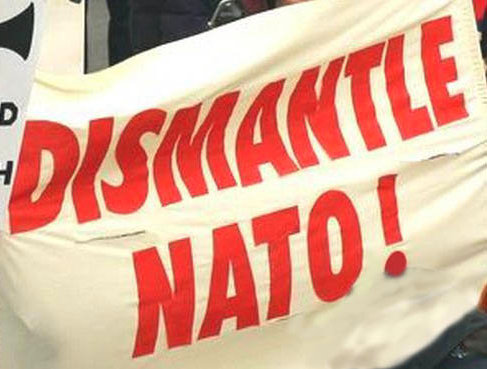 Reaffirming
"unequivocal support for the North Atlantic Treaty Organization as an
alliance founded on democratic principles," the resolution specifically
calls on Biden to "use the voice and vote of the United States to adopt
a new Strategic Concept for NATO that is clear about its support for
shared democratic values and committed to enhancing NATO's capacity to
strengthen democratic institutions within NATO member, partner, and
aspirant countries" and "to use the voice and vote of the United States
to establish a Center for Democratic Resilience within NATO
headquarters." The next NATO
Summit is scheduled to be held in Madrid, Spain, June 28-30.
Reaffirming
"unequivocal support for the North Atlantic Treaty Organization as an
alliance founded on democratic principles," the resolution specifically
calls on Biden to "use the voice and vote of the United States to adopt
a new Strategic Concept for NATO that is clear about its support for
shared democratic values and committed to enhancing NATO's capacity to
strengthen democratic institutions within NATO member, partner, and
aspirant countries" and "to use the voice and vote of the United States
to establish a Center for Democratic Resilience within NATO
headquarters." The next NATO
Summit is scheduled to be held in Madrid, Spain, June 28-30.
While the resolution is non-binding and does not carry the weight of law, it has significance in speaking of NATO not only as a military alliance but, in the name of democracy, as a weapon to be used to interfere in the internal affairs of "NATO member, partner, and aspirant countries."[1]
Since its inception NATO has not just been a military alliance commanded by the United States but also a political weapon which made sure the countries of Western Europe would not fall under communist rule and would remain under U.S. domination. This has been a main role of the Atlantic Council, formed in 1961 and based in Washington, DC, for example. It "galvanizes U.S. global leadership and engagement in partnership with allies" and acts to shape "the global future together" in the interests of the U.S. The U.S., which already commands NATO militarily, will likely be the one to use this latest weapon to serve its interests, just as NATO expansion has, including keeping Germany and other European countries in check.
The resolution was also passed in the context of the current U.S./NATO-instigated conflict in Ukraine. It states, as Biden does, that Ukraine is "on the frontlines in the contest between democratic values and autocracy." This, even though before the conflict Ukraine was considered to have an eroding and "backsliding" democracy, with rampant corruption and repression of rights.
The passing of the resolution also speaks to the ongoing conflicts among U.S. rulers as to how to secure U.S. world domination, including the role for NATO. While commonly such resolutions pass by near unanimous votes, for this one 63 Republicans voted against, more than 30 per cent of the Republicans in the House. A similar resolution in the Senate in 2018, for example, while Trump was in office and spoke of leaving NATO, passed by a vote of 97-2 in the 100-member body.
Targeting Member States
A main concern of the U.S., repeatedly expressed by Biden, is what the resolution calls "'democratic recession,' the global erosion of democratic norms, and the rise of authoritarianism." This is in reference mainly to Russia and China but also to forces within member states, what the resolution calls "internal threats from proponents of illiberalism." The U.S., using NATO, wants a justification to further interfere in the internal affairs of member states. It is using this "erosion," to emphasize the need to intervene to "strengthen democratic institutions." As well, the resolution states that "strengthening of democratic institutions is foundational to the collective security of Allies."
|
This concern about "democratic recession" also reflects the fear of U.S. and European rulers about the broad dissatisfaction among the people with governments and their institutions. There is a growing sentiment that the existing rulers are not solving any problems, are bent on war and use of violence and sanctions and are unfit to rule. The dysfunction of U.S. elections, Congress and the Executive, with the many conflicts within and between it and the military, are but one example. The hope of the rulers is that by emphasizing "democratic principles," they can lessen the peoples' dissatisfaction.
The resolution elaborates the necessity for all to adhere to the existing U.S.-style liberal democracy. It says, "A shared democratic identity is what distinguishes the Alliance from the principal threats and challenges it faces." NATO must "reassert its core identity as an Alliance rooted in the principles of democracy," it adds. It speaks to "political cohesion," reflecting the existence of contending interests within NATO itself. These are often expressed by Germany and France, such as over natural gas sanctions, and more recently by Turkey in relation to the entry into NATO of Finland and Sweden. It states, "Any commitment to strengthening NATO's political cohesion therefore has to be orientated toward those shared values and ideals, grounded in democracy, rule of law and individual liberty."
In addition, the resolution supports establishing an organizational mechanism for interference, namely "a Center of Excellence for Democratic Resilience in order to strengthen NATO democracies against external threats." There are so many institutions already, one wonders what this one will achieve that the others have not. It also goes without saying that the U.S., which will lead the way in such interference, is not considered a threat. The Center is one more intelligence agency "for monitoring and identifying challenges to democracy, human rights, and the rule of law and facilitating democracy and governance assistance to member, partner, and aspirant states, when requested."
Note the use of the phrase "when requested," the only such mention in the entire resolution to suggest that the U.S. supports the sovereignty of NATO members which is, of course, not the case. The U.S. is known to secure "requests" using threats and blackmail, as is currently the case with Colombia, considered an "aspirant" country to be used to establish NATO in Latin America and the Caribbean.
NATO's "New Strategic Concept"
The resolution also refers to "updating" NATO's "Strategic Concept." This concept is also for purposes of using the issue of "shared values" and "democracy" to bring all the member states in line. It states that NATO Secretary General Jens Stoltenberg, "has reiterated that one of the primary purposes of updating the Strategic Concept must be a recommitment to the founding values of the alliance." The resolution also states, "the NATO Parliamentary Assembly supports a new Strategic Concept that reaffirms that the support and strengthening of democratic institutions is foundational to the collective security of allies." And that the situation in "Ukraine underscores the importance of placing shared democratic values at the heart of NATO's Strategic Concept."
In this manner, a requirement for NATO member states and partners is to support these "shared democratic values" as dictated by the U.S. and accept "governance assistance," as it sees fit. As support for Ukraine shows, this "Strategic Concept" is about indebtedness to finance massive militarization, massively arming and creating conditions to block negotiations. Ukraine now has surpassed Israel and Saudi Arabia in receiving the most U.S. military funding.
The "New Strategic Concept" is basically a rehash of the 1990 Paris Charter for a New Europe and its demands to uphold "shared values." The Charter, which was to show the victory of U.S. democracy at the end of the Cold War, has resulted in the current crisis of liberal democratic institutions worldwide. The Center of Excellence for Democratic Resilience will also not be able to escape the fact that these democratic institutions are not on par with the needs of the times.
Conflict Among U.S. Rulers
 The vote on the U.S. resolution also underscores the conflicts
within U.S. ruling circles over how to secure U.S. domination in
conditions where alliances are shifting and the economies and military
strength of other major powers are growing. There are some, like the oligarchs behind
Trump, who think the U.S. should withdraw from NATO. As House
Representative Thomas Massie of Kentucky put it, explaining his No
vote, NATO is "a relic of the Cold War." He asked, "Why should
Americans pay for Europe's defence?"
Representative Warren Davidson of Ohio, referred to the call to "adopt
a new Strategic Concept for NATO that is clear about its support for
shared democratic values and committed to enhancing NATO's capacity to
strengthen democratic institutions within NATO member, partner, and
aspirant countries."
He said, "America's sovereignty is nonnegotiable. I suspect other
countries feel the same. We should be strengthening the alliance, not
reimagining it as a tool to interfere in one another's domestic
politics."
The vote on the U.S. resolution also underscores the conflicts
within U.S. ruling circles over how to secure U.S. domination in
conditions where alliances are shifting and the economies and military
strength of other major powers are growing. There are some, like the oligarchs behind
Trump, who think the U.S. should withdraw from NATO. As House
Representative Thomas Massie of Kentucky put it, explaining his No
vote, NATO is "a relic of the Cold War." He asked, "Why should
Americans pay for Europe's defence?"
Representative Warren Davidson of Ohio, referred to the call to "adopt
a new Strategic Concept for NATO that is clear about its support for
shared democratic values and committed to enhancing NATO's capacity to
strengthen democratic institutions within NATO member, partner, and
aspirant countries."
He said, "America's sovereignty is nonnegotiable. I suspect other
countries feel the same. We should be strengthening the alliance, not
reimagining it as a tool to interfere in one another's domestic
politics."
Representative Bill Pascrell Jr. of New Jersey, who supported the resolution, said those opposing were "evidence the GOP [Republican Party] truly is Putin's Party." Retired Lt. Gen. Mark Hertling, a former U.S. Army commander in Europe, said that "perhaps this divisiveness in the U.S. government remains one of Putin's strategic goals that hasn't yet been defeated."
Biden and the oligarchs who back him are among those who consider Russia a greater threat than China and that weakening Russia, as the U.S. is striving to do with the conflict in Ukraine, is the way to go and puts the U.S. in a stronger position to contend with China. Others consider striving for an alliance with Russia and India a better way to secure U.S. control over Europe and Asia.
All of them leave the peoples out of the equation. It is the peoples' growing resistance and demands for rights that provide a path forward that serves their interests, not the rich, not NATO. It is people's democracies and their anti-war governments that can provide the basis for peace and security.
Note
1. NATO interfered in every post-World War II election in Eastern Europe in an effort to use the party system of elections and government to defeat the striving of the people for peace, democracy and freedom through the establishment of People's Democracies. In Italy and France, it manoeuvred to get the communist parties to hand over their weapons and come under the influence of the Anglo-American party system of governance. It had communist leaders assassinated where they refused to disarm and come under the leadership of the Anglo-American forces. In Greece, they brought back the monarchy and established a fascist regime. They criminalized all those who fought in the resistance movement as communists, forced many into exile and imprisoned those who refused to renounce the resistance movement in concentration camps for as long as 40 years. The striving of the people for democracy did prevail and a social democratic government was installed.
All of this was carried out by Anglo-American intelligence agencies, including the precursor of the Central Intelligence Agency which the U.S. created with the members from the highest echelons of the Nazi SS.
The initials SS stand for Schutzstaffel, or Protection Squads. The SS was originally established as Adolf Hitler's personal bodyguard unit. It would later become both the elite guard of the Nazi Reich and Hitler's executive force, prepared to carry out all security-related duties, without regard for legal restraint.
Kissinger Addresses How the U.S. Should Proceed to Order and Divide the World
A plethora of former U.S. presidents and vice-presidents, secretaries of state, national security advisors, newspapers and pundits of various kinds have been giving opinions about the Ukraine crisis and discussing U.S. foreign policy and the direction it should take. On May 23, Henry Kissinger, four days before he turned 99 years old, spoke virtually at the World Economic Forum (WEF) in Davos, Switzerland. In the lead up to the WEF he also gave an interview to the Financial Times on May 9. He addressed the issues of Ukraine, China, Russia and nuclear weapons.
Considered by the ruling elites as an influential and veteran diplomat, Kissinger served as secretary of state and national security advisor under Presidents Richard Nixon and Gerald Ford in the 1970s. He was a main negotiator with Vietnam during the war and in the opening of U.S. relations with China during the Nixon administration. He is also known for orchestrating the 1973 coup d'état in Chile which began with the assassination of President Salvador Allende. He backed Operation Condor, notorious for its assassinations, torture and heinous crimes against progressive people, stopping at nothing to stamp out democratic movements in Chile, Argentina, Uruguay, Paraguay and other countries of Latin America and the Caribbean, as well as subsequent dirty wars.
About Greece he famously said:
"The Greek people are anarchic and difficult to tame. For this reason, we must strike deep into their cultural roots: Perhaps then we can force them to conform.
"I mean, of course, to strike at their language, their religion, their cultural and historical reserves, so that we can neutralize their ability to develop, to distinguish themselves, or to prevail; thereby removing them as an obstacle to our strategically vital plans in the Balkans, the Mediterranean, and the Middle East."[1]
Kissinger's speech to the WEF sought to promote a detente/deterrence equation. He said the U.S. and China should avoid confrontation, Taiwan should not be a focus or distraction and there should be a negotiated peace in Ukraine in the next two months.
He spoke the same day that President Biden once again provoked China on the issue of the status of Taiwan while speaking in Japan. Biden said the U.S. would intervene militarily if China invaded Taiwan -- something China has repeatedly said it would not do. Referring to the decades-long one-China policy, Kissinger said, "I think it is essential that these principles be maintained and the United States should not, by subterfuge or a gradual process, develop something of a two-China solution, and that China will continue to exercise patience that has been exercised up to now."
"A direct confrontation should be avoided, and Taiwan cannot be the core of the negotiations between China and the United States," Kissinger said. He elaborated further: "For the core of the negotiations, it is important that the United States and China discuss principles that affect the adversarial relationship, and that permit at least some scope for cooperative efforts. The Taiwan issue will not disappear, but as the direct subject of confrontation and adversarial conduct it is bound to lead to a situation that may mutate into the military field, which is against the world interest and against the long-term interest of China and the United States."
Referring to the U.S. and China, he added that "from the point of view of strategic potential, they are the greatest threat to each other -- in fact, the only military threat that each side needs to deal with continuously."
What this shows is that what underlies Kissinger's opposition to confrontation is the position that military action remains the main U.S. deterrent. This includes the fact that both the U.S. and China are nuclear powers, which is "the strategic potential" at the disposal of each of them which poses "the greatest threat to each other."
On Ukraine, he presented a view similar to the one given recently by the New York Times. He called for negotiations that accept the conditions as they were before the start of the conflict. "Parties should be brought to peace talks within the next two months. Ukraine should've been a bridge between Europe and Russia, but now, as the relationships are reshaped, we may enter a space where the dividing line is redrawn and Russia is entirely isolated. We are facing a situation now where Russia could alienate itself completely from Europe and seek a permanent alliance elsewhere. This may lead to Cold War-like diplomatic distances, which will set us back decades. We should strive for long-term peace." Continued conflict "could create upheaval and tensions that will be ever-harder to overcome," he said.
What is significant is the way he speaks about nuclear weapons, as though they can be used without worldwide destruction. "[T]here's almost no discussion internationally about what would happen if the weapons actually became used. My appeal in general, on whatever side you are, is to understand that we are now living in a totally new era, and we have gotten away with neglecting that aspect," he said. Referring to Putin, he asks: "[W]ill he escalate by moving into a category of weapons that in 70 years of their existence have never been used? If that line is crossed, that will be an extraordinarily significant event. Because we have not gone through globally what the next dividing lines would be."
While identifying China as the main threat, he also spoke to the importance of not driving China and Russia together, elaborating what he calls a differential approach. "I think it is unwise to take an adversarial position to two adversaries in a way that drives them together, and once we take aboard this principle in our relationships with Europe and in our internal discussions, I think history will provide opportunities in which we can apply the differential approach."
What Kissinger is saying is that Ukraine, Taiwan and other issues should be used to pit China and Russia against each other in a manner that favours the U.S. and prevents them from establishing a "permanent alliance." The proposal is not for purposes of securing peace, but to achieve U.S. aims of dominating Asia by threatening to use nuclear weapons against any country which continues to defy the U.S. dictate.
No to the Use of Nuclear Blackmail in the Name of Securing Peace!
Note
1. Henry Kissinger, while addressing a group of Washington, D.C. businessmen in Sept.1974, (as reported in Oikonomikos Tachydromos, Aug 14, 1997)
Conception of Total War to Order the World
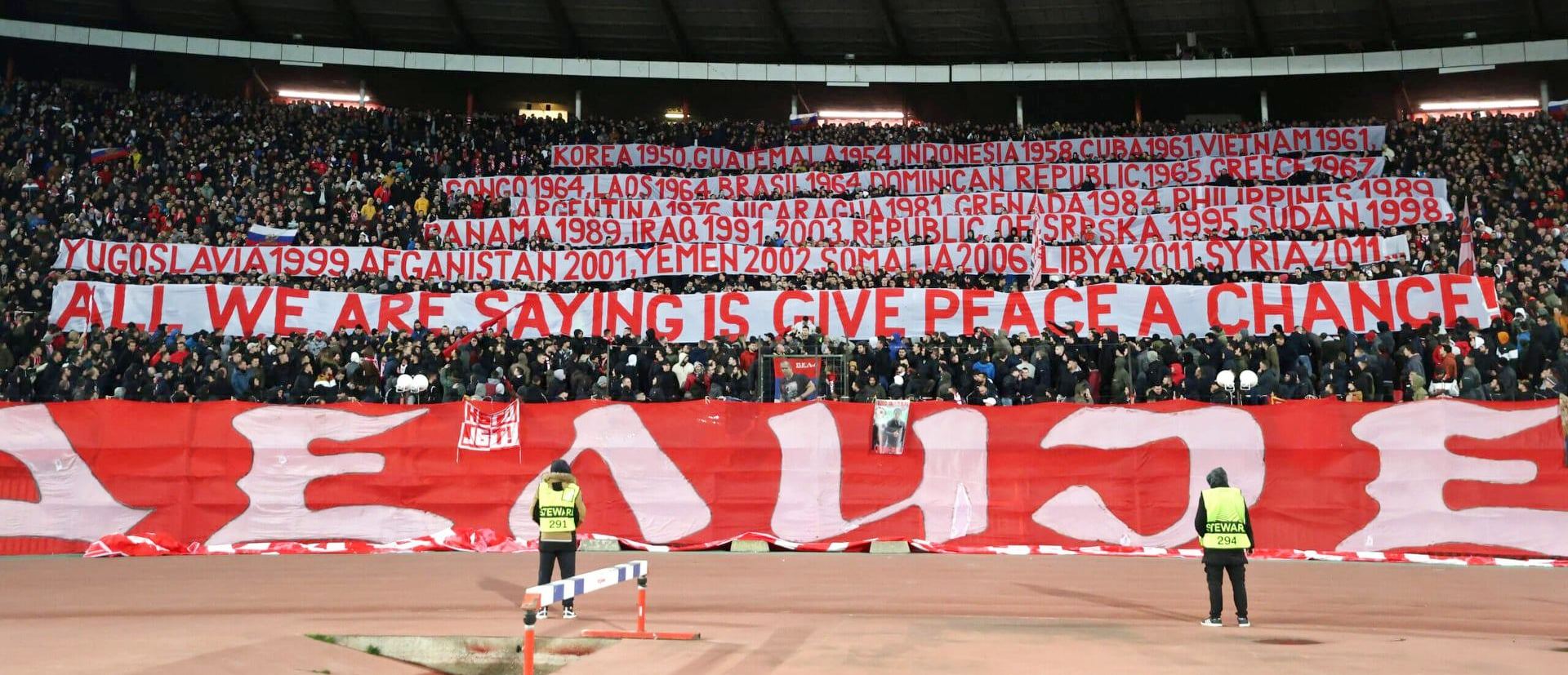
Serbian football fans' banners name countries that have been subject to U.S./NATO military aggression, March 17, 2022.
The tone of the speech by Henry Kissinger, former U.S. Secretary of State and National Security Advisor to Richard Nixon and Gerald Ford, delivered to the Davos World Economic Forum on May 23, and of his May 9 interview with the Financial Times, is one of detente and negotiations. But the essence of what he means lurks behind this talk, which is the promotion of the use of nuclear weapons.
Keep in mind that Kissinger was the one who, during peace negotiations with Vietnam, threatened to use nuclear weapons against Vietnam 13 times. This threat is what, in U.S. parlance, constitutes "a deterrent."
Since the U.S. detonated two atomic bombs over the Japanese cities of Hiroshima and Nagasaki on August 6 and 9, 1945 respectively, killing between 129,000 and 226,000 people, most of them civilians, there has been no other direct use of nuclear weapons in armed conflict. The threat of their use has, however, regularly been used by the U.S. for purposes of blackmailing and threatening countries to force them to comply with whatever the U.S. seeks to impose at any particular time. The Vietnamese showed that this blackmail did not intimidate them and that it is the peoples fighting for their rights that wins wars, not weaponry.
Certain states monopolized the possession of nuclear weapons and justified this as necessary to defend their sovereignty, while depriving others of the right to defend their sovereignty. In the course of this, the U.S. developed the conception of Total War, as distinct from the conception of Absolute War. Absolute War was still war with political aims which permits arriving at a negotiated settlement. Total War is not war as politics by other means. It is war of destruction, with nuclear weapons able to wipe out whole countries and go beyond limited territory.
The conception of Total War was formulated in the context of proposals to use nuclear weapons against revolutionary civil wars, first in Korea and then in Vietnam. For instance, it was the option favoured by General MacArthur to obliterate the Korean resistance led by Kim Il Sung and to wipe out the Chinese volunteers who joined that resistance. They were not used, in part because the U.S. military and presidency could not agree on also using nuclear weapons against China. Instead, the U.S. carried out carpet bombing of civilians and infrastructure in Korea and used chemical and biological weapons.
Since the Korean War launched by the U.S. in 1950 in its attempt to take over the entire Korean Peninsula, dominate China and establish a bridgehead between Russia and China, nuclear weapons have been put into a special category. Their use is treated as "unthinkable." By introducing the conception of Total War, the issue became not the kind of war -- national liberation, civil war, world war -- but whether it is limited, without nuclear weapons, or unlimited. The current contention over what to do about the Ukraine conflict, for example, becomes about the forms of warfare available. Can conventional warfare achieve U.S. aims, or are unconventional methods needed, and how will Russia and Europe respond to either?
Nuclear weapons and weapons of mass destruction are considered unconventional. The use of napalm, white phosphorous, bunker busters, and GBU-43/B Massive Ordnance Air Blast, or Mother of All Bombs (MOAB) are considered part of conventional warfare.
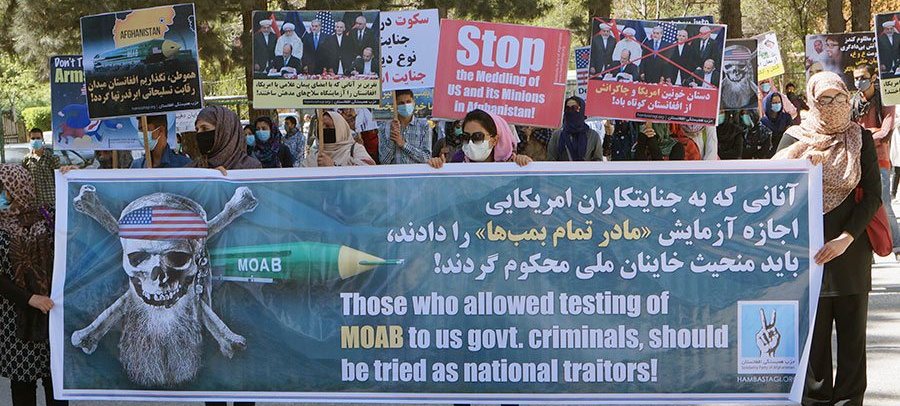
Protest in Kabul, Afghanistan against U.S. use of MOAB in Afghanistan, April 16,
2017.
Kissinger's aim is to centre the discussion, for the rulers and among the people, on the issue of whether to wage conventional or unconventional war. Once that is the discussion, the use of nuclear weapons is supposed to become a bargaining chip. This is true now and not just used between big powers that have weapons, but also to threaten peoples standing up to U.S. dictate and to justify aggression. In other words, the ability of the United States to order and divide the world is directly related to this conception of Total War.
A big part of the U.S./NATO strategy is to goad Russia and China into doing something to show that U.S. deterrence -- the threat to go nuclear -- works. Deterrence functions only in the context of Total War, that the U.S. can say it can wipe out entire countries and get those countries to capitulate to it. No one can escape from this Total War. The opposition to the nuclear threat, said to be "unthinkable," takes the form of saying the nuclear threat to unleash Total War has to be stopped. If the peoples and other countries line up behind forces represented by Kissinger, who claim to be for peace and detente, the nuclear threat will have achieved its aim.
It is part of the disinformation which is aimed at making sure the peoples of the world are disoriented and their striving for peace cannot take form; it is disinformed. It is to block the peoples from pursuing their own plans to achieve peace by mobilizing to affirm their claims on society. Instead they are to line up behind those they perceive stand for detente and against Total War, that is wars which will annihilate humankind.
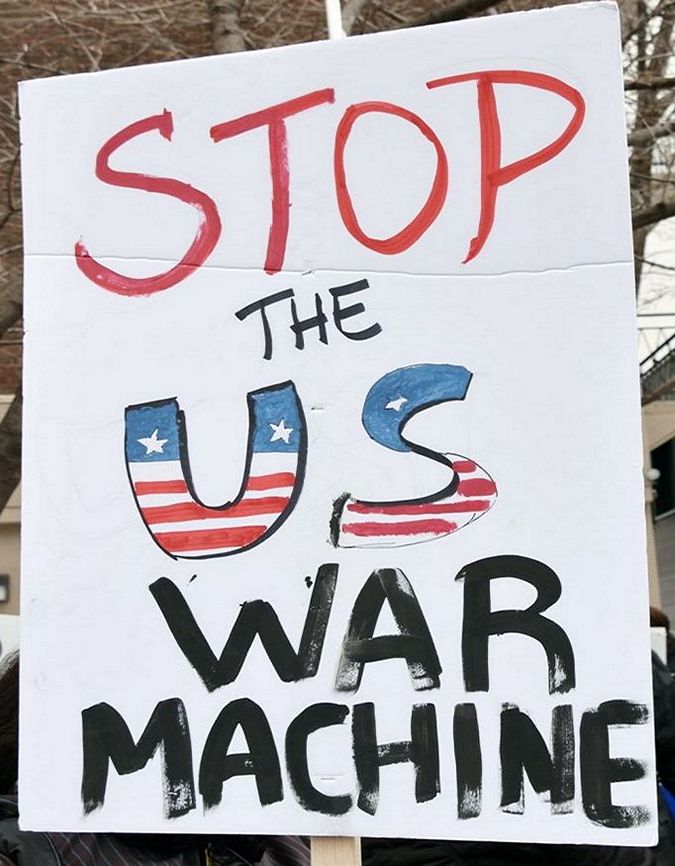 The
entire conversation leaves out the central role of the peoples of Asia,
Africa, Latin America and the Caribbean as well as the peoples of the
U.S./NATO countries and others in shaping a New World Order. Instead of
looking at the world as is and fighting to establish anti-war
governments under
the control of the peoples, they are instead to join in creating a New
World Order by supporting a multipolar equilibrium or polycentric
equation, against the conception that the U.S. is the indispensable
nation to which everyone must submit. However, so long as the peoples
are left out of the
equation there will be nothing new about whatever world order is
established by the U.S./NATO forces. Indeed, the likes of Kissinger
have tried their utmost to crush the organized resistance of the
peoples striving for peace, freedom and democracy and the U.S./NATO
cabal are trying to do the
same.
The
entire conversation leaves out the central role of the peoples of Asia,
Africa, Latin America and the Caribbean as well as the peoples of the
U.S./NATO countries and others in shaping a New World Order. Instead of
looking at the world as is and fighting to establish anti-war
governments under
the control of the peoples, they are instead to join in creating a New
World Order by supporting a multipolar equilibrium or polycentric
equation, against the conception that the U.S. is the indispensable
nation to which everyone must submit. However, so long as the peoples
are left out of the
equation there will be nothing new about whatever world order is
established by the U.S./NATO forces. Indeed, the likes of Kissinger
have tried their utmost to crush the organized resistance of the
peoples striving for peace, freedom and democracy and the U.S./NATO
cabal are trying to do the
same.
As resistance goes forward, instead of bipolar or multipolar or unipolar, where the world order remains centred on the big powers, it is becoming clear that a human-centred world order is needed. The peoples are stepping up their anti-war, pro-social efforts worldwide. They oppose the use of force to settle conflicts between countries. This includes the threats of the U.S./NATO countries to unleash Total War against Russia, China and peoples worldwide. The peoples strive to humanize the natural and social environment by activating the human factor/social consciousness to resolve problems in a manner which favours the peoples. It is they who are bringing forward a human-centred world order.
(With files from the Hardial Bains Resources Centre)
Lend-Lease Law Strengthens Executive Authority
at Home and
U.S. Control over Europe
President Biden on May 9 signed into law an updated Lend-Lease Act. It gives the President authority to bypass existing laws concerning weapons sales and to more rapidly send even more lethal military weaponry and supplies to Ukraine and Eastern European countries. As with the use of lend-lease during World War II, the program enriches the moneylenders and those narrow private interests engaged in war production while also strengthening the power of the U.S. Presidency at home to by-pass Congress and increase its control over Europe. (It was not until 2006, for example, that Britain fully repaid its lend-lease debts to the United States from World War II.)
 The House passed the Ukraine Democracy Defense
Lend-Lease Act of 2022 on a 417-to-10 vote while the Senate
passed it unanimously. Its passage was followed by Congress approving
another $40 billion in aid to Ukraine, bringing the funding given in
the past four months to $53 billion, most
of it for military purposes. Ukraine now surpasses both Israel and
Saudi Arabia as the largest recipient of U.S. military aid. The $53
billion is more than Germany or Japan's military budgets for all of
2021.
The House passed the Ukraine Democracy Defense
Lend-Lease Act of 2022 on a 417-to-10 vote while the Senate
passed it unanimously. Its passage was followed by Congress approving
another $40 billion in aid to Ukraine, bringing the funding given in
the past four months to $53 billion, most
of it for military purposes. Ukraine now surpasses both Israel and
Saudi Arabia as the largest recipient of U.S. military aid. The $53
billion is more than Germany or Japan's military budgets for all of
2021.
As the U.S. Defense Department (DoD) put it: "The act authorizes the administration, through fiscal year 2023, to lend or lease military equipment to Ukraine and other Eastern European countries. The act would exempt the administration from certain provisions of law that govern the loan or lease of military equipment to foreign countries, such as the five-year limit on the duration of the loan or the requirement that receiving countries pay all costs incurred by the United States in leasing the defence equipment."
The President can decide terms of the leases and repayment. "Payments received under leasing agreements with foreign countries are deposited in the Treasury Department," DoD says. Longer leases mean more funds for the financiers.
When signing the law, Biden covered up who it favours by saying it is to fight aggression. "The cost of the fight is not cheap, but caving to aggression is even more costly. That's why we're staying in this," he said. What he is in fact saying is that the U.S. will continue to extend and foment the Ukraine conflict. To turn truth on its head, Biden signed the law on May 9, the day the Russians commemorate all those who sacrificed their lives to defeat Nazi-fascism in World War II. Biden claimed the law reaffirms "the enduring commitment to the future grounded in democracy, human rights, and peaceful resolution to disagreements." Yet the armed forces the U.S. is funding and equipping are under the control of neo-Nazis whose aim has nothing to do with democracy, human rights or a peaceful resolution to disagreements.
The euphoria promoted forgets to mention that to pay for the leases, the countries involved will need to borrow from the global financiers, who directly benefit. As well, Biden's executive authority and the additional $40 billion means yet billions more in public funds for the war profiteers. Ukraine will also be able to purchase new weapons, which Biden can now demand from Boeing, General Dynamics, Lockheed Martin, Northrop Grumman, Raytheon, etc. Indeed, in late April, anticipating passage of the Lend-Lease Act, Biden and the Pentagon met with these oligarchs to demand increased production.
The U.S./NATO express the hope that the increase in aid and military equipment will be a game-changer for Ukraine and decide the outcome of the conflict in their favour. By prolonging the conflict with more funds, weapons, training and intelligence data, the U.S./NATO countries seem to think Ukraine can win the war. Their stand presupposes that weapons decide the outcome of wars and that Russia will now throw more of its own into the conflict as well. They are also banking on sanctions crushing the Russian economy -- something that has failed to date.
For Your Information
Use of Lend-Lease in World War II
The current Lend-Lease Act updates a 1941 law the United States used to supply allies, especially Britain, during World War II and to position itself for greater control of Europe after the war. The 1941-45 Lend-Lease Act authorized the President to "sell, transfer title to, exchange, lease, lend, or otherwise dispose of, to any such government [whose defense the President deems vital to the defense of the United States] any defense article."
At the time the U.S. provided for repayment not necessarily in terms of money or returned goods, but as the State Department then put it, in "joint action directed towards the creation of a liberalized international economic order in the postwar world." This included support for post-WWII financial institutions dominated by the U.S. like the World Bank and International Monetary Fund. Both are notorious for strengthening U.S. domination while providing untold profits to the financiers and indebting and wrecking the economies of countries worldwide.
Britain was a main recipient of the estimated $50.1 billion worth of mainly military supplies provided by the U.S. -- equivalent to $690 billion in 2020 dollars. This included ships, planes, tanks, etc. Before the original Lend-Lease Act was passed in 1941, the U.S. arranged for 50 U.S. Navy destroyers to be transferred to the British Royal Navy and the Royal Canadian Navy in exchange for basing rights in the Caribbean. Then British Prime Minister Winston Churchill also granted the U.S. base rights in Bermuda and Newfoundland for free.
At the end of the war, significant shipments of military supplies were still being sent to Britain. In 1946, a post-war U.S. loan further indebted Britain to the U.S. with an initial Lend-Lease loan valued at more than one billion pounds. Repayment was stretched over 50 annual installments, starting in 1951 and with five years of deferred payments, at two per cent interest. Accumulating interest over decades, Britain did not make the final payment of $83.3 million until December 2006.
Thus, the latest Lend-Lease Act is also an instrument to further indeb and control Ukraine and countries of Eastern Europe while providing more profits to the financiers and military oligarchs.
NATO's Immediate Plans
NATO Meeting of Top Military Authorities

Demonstration in Finland, June 4, 2022 against joining NATO.
NATO's Military Committee, the aggressive alliance's highest military authority, met in Chiefs of Defence format at its headquarters in Brussels, Belgium on May 19. The Military Committee is the senior military authority in NATO and the oldest permanent body in NATO after the North Atlantic Council. NATO Chiefs of Defense are commonly the top military generals of the given country, such as General Wayne Eyre for Canada and General Mark Milley of the U.S., Chairman of the Joint Chiefs of Staff. While NATO has a Military Committee, it does not have its own armed forces. Instead, each country decides whether and how many forces to contribute to a given war or military aggression, under U.S. military command.
The Military Committee meeting was attended by the Chiefs of Defence from the 30 NATO member countries, as well as officials from Sweden and Finland, which had applied for NATO membership a few days earlier. The meeting was presided over by Admiral Rob Bauer of the Royal Netherlands Navy, who is Chair of the Military Committee. They were joined by Supreme Allied Commander Europe, U.S. General Tod Wolters, and Supreme Allied Commander Transformation, General Philippe Lavigne of France. The Chiefs of Defence also met with the officials from Australia, Japan, New Zealand, and the Republic of Korea regarding developments in the Indo-Pacific.
The meeting comes ahead of NATO's summit in Madrid from June 28-30, where heads of state of NATO countries are supposed to approve a range of recommendations "to further adapt and strengthen the Alliance as well as NATO's new Strategic Concept."
In his opening remarks, Admiral Bauer stated that "Adaptation is the main topic of our meeting here today. [...] In these past few months, NATO has shown that it is capable of swiftly and effectively changing its posture. The foundation for that response came from the work that this committee started years ago. Together with the Strategic Commanders we developed the NATO Military Strategy, followed by the Concept for the Deterrence and Defence of the Euro-Atlantic Area (the DDA), and the NATO Warfighting Capstone Concept (the NWCC)."[1][2] NATO's adaptation specifically means how it will expand its reach into various domains, including the governance of NATO countries -- using terms like "political leadership" -- as well as cyber space.
Despite all evidence to the contrary, Admiral Bauer went on to justify NATO warmongering in terms of collective defence against some imminent threat and preparing to "expect the unexpected, in any domain, from any potential aggressor, in any part of the Euro-Atlantic Area."
NATO's expansion as well as its invasions and occupations of Yugoslavia, Afghanistan and Libya, have created ongoing instability and insecurity for the people of Europe, Asia and Africa. Nonetheless, Admiral Bauer claimed: "It is our adversary who determines the timeline, and it is up to us as a defensive Alliance to make sure that we are always ready to protect the one billion citizens who live on Allied soil, and deter and defend the threats from Russia and the international terror groups. Therefore, it is of the utmost importance for us to provide the political leadership with our unfettered military advice on NATO's future posture and the continued adaptation, which will in turn allow them to take informed decisions."
In the first session of the meeting, NATO Secretary General Jens Stoltenberg briefed the Military Committee on the current geopolitical situation, discussing the dramatically altered security environment and the further adaptation of NATO.
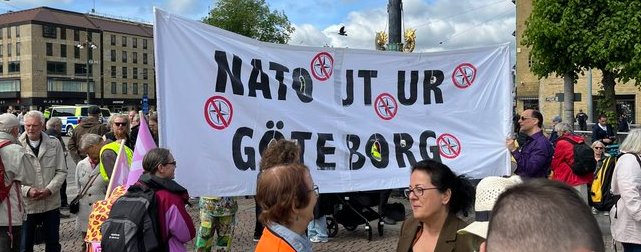
Demonstration in Gothenburg, Sweden, May 22, 2022, against joining NATO.
The second session focused on Russia's special military operation in Ukraine, with Chiefs of Defence from NATO, Finland, Sweden, and Ukraine participating.
General Wolters briefed the Military Committee on the implementation of the Concept for the Deterrence and Defence of the Euro-Atlantic Area and the longer-term posture of the Alliance.
General Lavigne provided an update on the implementation of NATO's Warfighting Capstone Concept, Multi-Domain Operations and the ongoing "digital transformation" of NATO. The Military Committee discussed the importance of the new Strategic Concept and how this could drive NATO's military adaptation.
On digital transformation, General Lavigne said: "We are, first of all, convinced that we have to continue with building our capacity to engage and be able to operate in multi-domain operations ... in all five operational domains: land, sea, air, space and cyber." The digital transformation will make the alliance "more agile, and even more coherent, and this digital transformation is the most important enabler of multi-domain operation," he added.
"Transformation is not only technology, it is innovation, it is a mindset change, it is people and their new skills," General Lavigne continued. "The Russian aggression in Ukraine, and the consequences that war produced for the security of the Euro-Atlantic area is an additional trigger to accelerate the path of transformation."
The digital transformation will make the alliance "more agile, and even more coherent, and this digital transformation is the most important enabler of multi-domain operation," he added.
General Lavigne stated that multi-domain operations are "both a strategic challenge and an opportunity. It is a challenge, because we have to develop the ability to deal and synchronize with multiple actors, military, governmental, civilian and industry. And it's also an opportunity because we will be stronger together."
The focus on cyber space as part of NATO's "multi-domain operations" is notable given the high level of disinformation about Ukraine and Russia's special military operation at this time. This emphasis can also be seen in Canada where cyber security agencies are attempting to defame those who criticize NATO and its warmongering as "agents of foreign powers." All of it is intended to undermine the people's longstanding opposition to the aggressive imperialist aims of the U.S.-led NATO alliance.
Notes
1. At a November 2021 meeting of the Military Committee, U.S. General Tod Wolters stated that the Concept for the Deterrence and Defence of the Euro-Atlantic Area "unites national, regional, and theatre-wide military efforts to a common purpose. It provides nations with a framework to align respective national military deterrence activities in peacetime and, if directed, defend in crisis and conflict... all nested underneath the NATO 2030 initiative."
NATO calls the NATO 2030 initiative "an ambitious agenda to make sure NATO remains ready, strong and united for a new era of increased global competition."
The full details of NATO 2030 can be found here.
2. According to the NATO website, the NATO Warfighting Capstone Concept concerns "how NATO Allies must develop their militaries to maintain advantage for the next twenty years.
"The concept outlines a threat informed vision of the challenges NATO faces today and tomorrow, the military instrument Allies need for success, and a realistic path to get there by pulling forward and continuously refining the most important warfare development work towards five essential Warfare Development Imperatives." These five "imperatives" are: cognitive superiority, layered resilience, influence and power projection, cross-domain command, and integrated multi-domain defence.
Agenda of the NATO Summit in Madrid, June 28-30

May 7, 2022 action, part of mobilization against the Madrid NATO Summit.
The warmongering U.S.-led North Atlantic Treaty Organization (NATO) will hold a Summit from June 28 to 30 in Madrid, Spain. The NATO Madrid Summit, the 32nd since NATO's founding in 1949, is being held on the 40th anniversary of Spain's accession to NATO. The two previous summits were in Brussels, on March 24, 2021 and a virtual summit on February 24 in response to the crisis caused by NATO's eastward expansion which threatens Russia's security and ignited the latter's special military operation on that date.
A summit brings together heads of state and government for a meeting, held at "important junctures" in NATO's decision-making process. Summits are held, for example, "to introduce new policy, invite new members into the Alliance, launch major initiatives and reinforce partnerships."
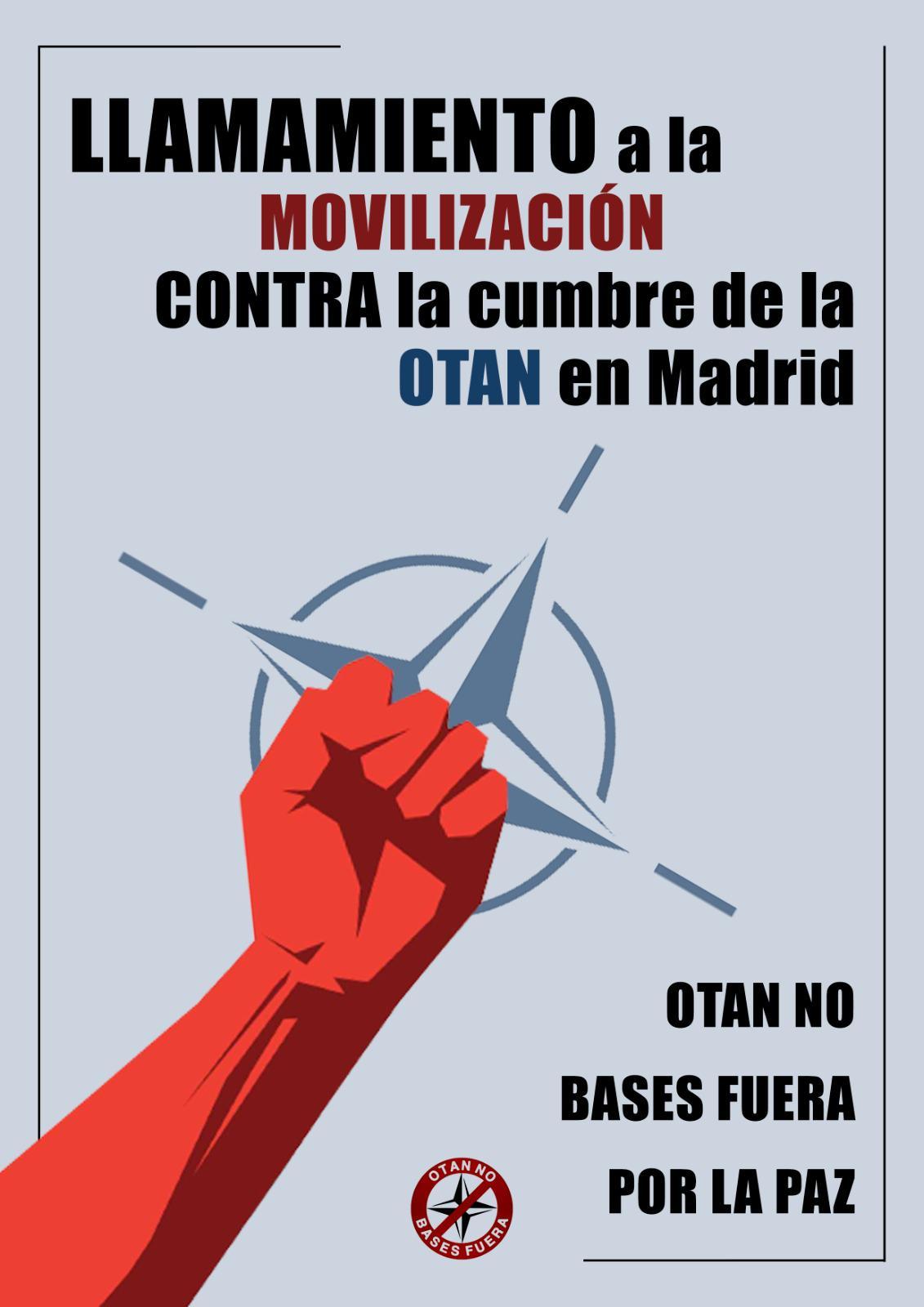 The Madrid Summit takes place in the context of the NATO 2030
Agenda, launched at the 2021 summit in Brussels, which is aimed at
making "NATO stronger and fit for the future." The Madrid Summit aims
to adopt a "New Strategic Concept" to promote its nine major
priorities: 1) deepen political
consultation and coordination, 2) strengthen deterrence and defence, 3)
improve resilience, 4) preserve the technological edge, 5) uphold the
rules-based international order, 6) boost training and
capacity-building, 7) combat and adapt to climate change, 8) develop
the next strategic concept, and 9)
invest in NATO.
The Madrid Summit takes place in the context of the NATO 2030
Agenda, launched at the 2021 summit in Brussels, which is aimed at
making "NATO stronger and fit for the future." The Madrid Summit aims
to adopt a "New Strategic Concept" to promote its nine major
priorities: 1) deepen political
consultation and coordination, 2) strengthen deterrence and defence, 3)
improve resilience, 4) preserve the technological edge, 5) uphold the
rules-based international order, 6) boost training and
capacity-building, 7) combat and adapt to climate change, 8) develop
the next strategic concept, and 9)
invest in NATO.
Major agenda items expected to be discussed at this summit are:
- adoption of NATO's next strategic concept, to replace the one adopted at its Lisbon Summit in 2010;
- Russia's special military operation in Ukraine; and
- the application of Finland and Sweden for membership.
As per NATO's statutes, Finland and Sweden's application for NATO membership requires the unanimous support of all existing NATO member countries. Their application is not supported by Turkey, a founding member of NATO, with the largest military after the U.S. of any NATO country. The support of Finland and Sweden for Kurdish organizations that Turkey considers terrorist is cited as the reason to reject their applications. Thus far, attempts by Turkey to negotiate an agreement on this matter have failed.
The Madrid NATO Summit comes at a time when the U.S. imperialists and the NATO member countries are broadening the scope of the aggressive alliance's operations. They are insinuating NATO into more and more countries and using it to interfere in their internal affairs, including on matters of concern, such as climate change. In all of these cases, NATO and its activities provide no solutions, but only exacerbate the crises facing humanity.
U.S./NATO expansion and warmongering are a serious concern for the peoples of the world, including the people of Canada, which is integrated, holus-bolus, into the U.S. war economy and war machine.
Membership in NATO goes against the longstanding desire of Canadians that their country be a force for genuine peace in the world, as well as their rejection of U.S.-led invasions, occupations and interference in other countries, and their demand that NATO and other aggressive alliances be dismantled.
This striving for peace and opposition to NATO will be expressed in Madrid at the People's Peace Summit and other events convoked to express opposition to NATO and the dangers it poses to Europe and the world at this time.
NATO's New Strategic Concept
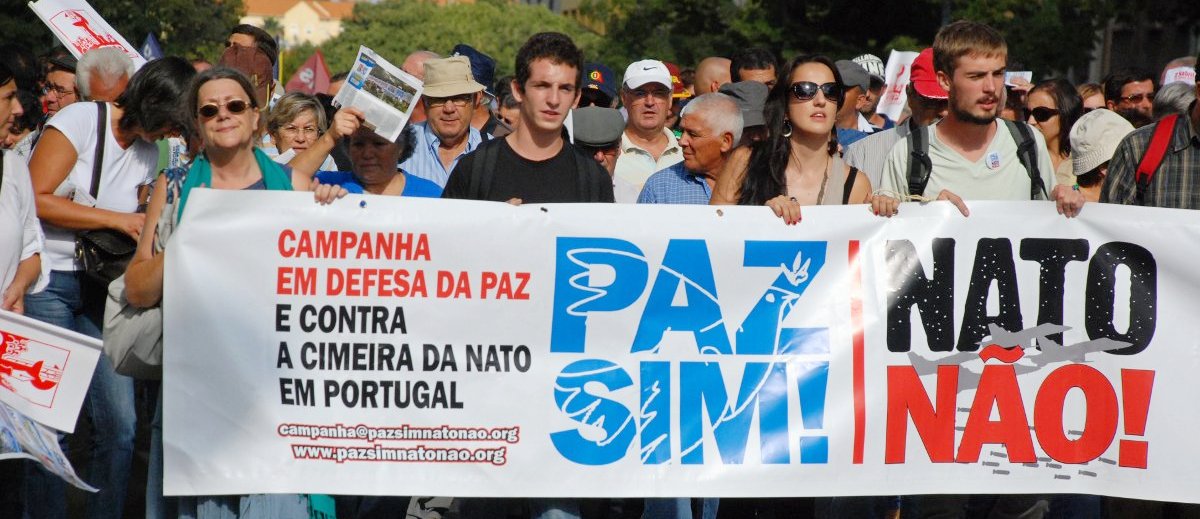
Protest at 2010 NATO Summit in Portugal where last Strategic Concept was adopted.
NATO is set to adopt a "New Strategic Concept" at its 2022 Madrid Summit to be held on June 28-30. NATO sets its strategic concept roughly every 10 years "to take account of changes to the global security environment and to make sure the Alliance is prepared for the future," its website informs. It says its strategic concepts are second in importance only to its founding North Atlantic Treaty. "The world has fundamentally changed in the past decade and strategic competition is rising, so the time has come to update the Strategic Concept. The last Strategic Concept was adopted at the Lisbon Summit in 2010; the new one will build on elements of the 2010 Concept that are still relevant," NATO says.
"The Strategic Concept sets the Alliance's strategy. It outlines NATO's enduring purpose and nature, its fundamental security tasks, and the challenges and opportunities it faces in a changing security environment. It also specifies the elements of the Alliance's approach to security and provides guidelines for its political and military adaptation," the website says.
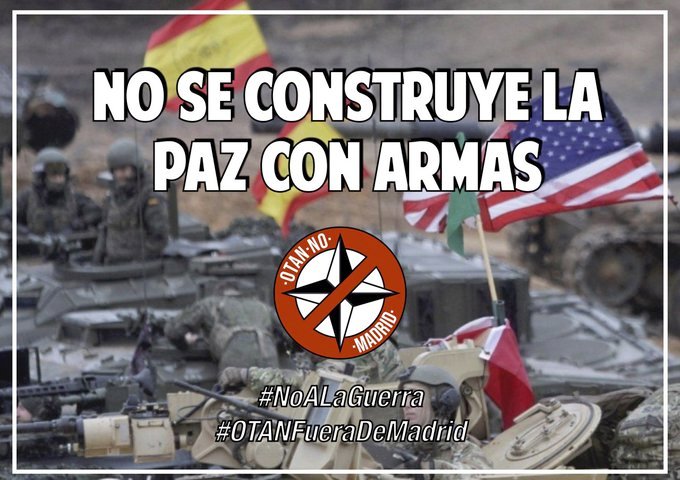 The 2010 current strategic concept is called "Active Engagement,
Modern Defence." NATO says it "presents NATO's three essential core
tasks -- collective defence, crisis management and cooperative
security." It claims to also emphasize "Alliance solidarity, the
importance of transatlantic
consultation and the need to engage in a continuous process of reform."
The 2010 current strategic concept is called "Active Engagement,
Modern Defence." NATO says it "presents NATO's three essential core
tasks -- collective defence, crisis management and cooperative
security." It claims to also emphasize "Alliance solidarity, the
importance of transatlantic
consultation and the need to engage in a continuous process of reform."
Describing its challenges and "threats," NATO says its current Strategic Concept "describes the 2010 security environment and identifies the capabilities and policies needed to ensure that NATO's deterrence and defence, as well as crisis management abilities, are equipped to face today's threats. These threats include, for instance, the proliferation of ballistic missiles and nuclear weapons, terrorism, cyber attacks and fundamental environmental problems. The Strategic Concept also affirms how NATO aims to promote international security through cooperation. It will do this by reinforcing arms control, disarmament and non-proliferation efforts, emphasizing NATO's open door policy for all European countries, and significantly enhancing its partnerships in the broad sense of the term. Additionally, it affirms that NATO will continue its reform and transformation process."
This self-serving and imperious description belies NATO crimes in its bombing and dismemberment of Yugoslavia in 1999 and its war on Libya in 2011, carried out in the name of "human security." Regarding promotion of "international security through cooperation," it is precisely NATO's refusal to reach a negotiated resolution to Russia's security concerns and its interference in the internal affairs of Ukraine for purposes of isolating and crushing Russia that has led to the current crisis. As concerns the reinforcement of "arms control, disarmament and non-proliferation efforts," NATO countries, having created an entirely avoidable conflict with Russia, are now pumping more weapons with greater range and destructive power into Ukraine, deepening the security crisis in the region.
NATO states that at the 2021 Brussels Summit, Secretary General Jens Stoltenberg was charged with developing the next strategic concept. Stoltenberg says he has been conducting internal consultations "on NATO's evolving strategic environment, approach and priorities," as well as "engaging with partners, other international organizations, and with expert communities, youth organizations, civil society and the private sector."
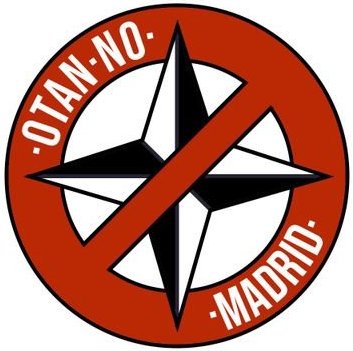 This "consultation phase," is followed by members negotiating and
agreeing with the next strategic concept, with heads of state endorsing
it at the Madrid Summit.
This "consultation phase," is followed by members negotiating and
agreeing with the next strategic concept, with heads of state endorsing
it at the Madrid Summit.
The NATO website shows that it has held at least 35 events pertaining to the new Strategic Concept since at least September 2021.[1] They include:
- NATO's Next Strategic Concept: What Role for Climate Security? ( Berlin Climate and Security Conference 202, Berlin, Germany, September 28, 2021)
- Needing NATO: Necessary Notes for Concrete Concepts (Halifax International Security Forum, November 20, 2021)
- NATO's new Strategic Concept: View from Sweden (Embassy of United Kingdom to Sweden, Stockholm, Sweden, March 7, 2022)
- Towards NATO's Next Strategic Concept: Challenges and Opportunities for NATO Allies (EDAM, Istanbul, Turkey, March 24, 2022)
- Workshop: Human Security and the 2022 NATO Strategic Concept (RAND Europe, NATO HQ, Brussels, Belgium, April 21, 2022); and
- Roundtable on NATO's Strategic Concept: View from Finland (Embassy of Romania in Finland, Helsinki, May 9, 2022).
These excerpts from a background paper issued at the March 24 meeting in Istanbul, give an idea of the aims of the new Strategic Concept:
"The current Strategic Concept which was adopted in 2010 served NATO Allies well. However, the security environment has dramatically changed since then. Even the last few weeks have shown us how dramatic developments like the Russian invasion of Ukraine in blatant violation of the fundamental principles that have underpinned the European security can happen now in the European continent. [...] It was in the face of these aggressive pattern of behaviour of Russia that NATO declared it as one of the main threats to consider. The same year ISIL/DAESH gained ground with its terrorist attacks in Syria and Iraq that culminated to the control of territories by this terrorist organization. NATO has taken series of decisions since then to bolster its deterrence and defence that resulted with its military adaptation. NATO has implemented the biggest reinforcement of collective defence in a generation. There is no doubt that in the foreseeable future a more aggressive Russia with its revisionist approach to the European security paradigm and terrorism with all its forms and manifestations will remain to be the main threats that Allied nations will continue to confront. [...]
"NATO must adapt to meet the requirements of a more demanding strategic environment marked by the return of systemic rivalry. In this geostrategic competition although China does not pose a direct military threat to NATO, at least at present, it is a rising power which should be addressed from the prism of both challenges and opportunities. NATO should sharpen its assessment capacity on China since it is no longer a far distant country away from NATO area but also because of the implications of a deeper Russia-China alliance as illustrated by the Russia-China joint statement of February 4. It is present in different parts of Europe and in the adjacent geographies. NATO should be able to intensify political consultations with partners in the Asia-Pacific region, but also cooperate and coordinate with the EU. The question regarding how to engage with China should be addressed properly and in a timely manner. In short, NATO will need to become the main transatlantic forum where the Western approach to China will be discussed. This requirement is also set to enhance NATO's political role.
"Emerging and disruptive technologies are becoming a game changer in the security realm with the efforts of our competitors and potential adversaries as States and non-state actors. Therefore, maintaining NATO's technological edge, while elevating cooperation among Allies in military technology to reinforce interoperability, and putting innovation in NATO's activities will be a key priority. New threats and challenges with the use of hybrid concepts, that include cyber-attacks and cyber technologies-enabled disinformation campaigns target our societies and democratic values. These require strengthening of the societal resilience in Allied and partner countries. Protection of critical infrastructure, and security and diversity of our supply chains are of vital importance. NATO will remain as a regional organization in the future as it has been so far. Nevertheless, this does not prevent NATO to adopt a more global approach since many of the threats and challenges we face are of global nature, like terrorism, hybrid and cyber-attacks or climate change. This requires effective cooperation with partners and other international organizations like the EU.
"While NATO will remain strong militarily, it would be important to make it stronger politically. In achieving NATO's 2030 vision the Allies should redouble their commitments to adhere to the common values like democracy, individual liberties and the rule of law, enshrined in the North Atlantic Treaty. Unity, cohesion and solidarity among Allies are important features of a strong politico-military Alliance. To use NATO more as an essential and unique forum of transatlantic consultations will be important more than ever given the complex and trying security environment that we are in.
"On the other hand, NATO should fulfill its facilitating role in ironing out any bilateral difference that may surface between individual Allies. As the report entitled 'NATO 2030: United for a New Era' by the Independent Experts Group states: 'A drift toward NATO disunity, should it occur, must be seen a strategic rather than merely tactical or optical problem. Arriving at a convergence of political and strategic priorities is possible, necessary and in keeping with the traditions of the Alliance.'"
The NATO Parliamentary Assembly (NATO PA) held a forum in Washington, DC from November 29 to December 1, 2021 to discuss the upcoming Strategic Concept and how it will be imposed on the parliaments of member states. In its own words, this body brings together parliamentarians from NATO countries "to discuss and influence decisions on Alliance security."
NATO PA's own report on this event stated in part that "a common thread of discussions was the importance of reaffirming NATO's commitment to shared democratic values. The NATO PA has called for the creation of a Democratic Resilience Centre within NATO to serve as a resource of best practices, networking and cross-fertilization on democratic benchmarks, available to NATO members, partners and aspirant countries upon request. [...] Delegates also welcomed NATO Secretary General Jens Stoltenberg's statement in Riga, where he identified protecting NATO's democratic values as first among five essential elements for the new Strategic Concept. "
The Parliamentary Assembly underscored that the "threat from Russia and challenges from China loomed large throughout the Forum's deliberations. Both are skillfully using a combination of military means and hybrid techniques to undermine the international rules-based order, to sow divisions among the Allies and to bully their neighbours. Russia's renewed military build-up in and around Ukraine was an urgent and serious concern for NATO Allies -- as made clear by NATO Foreign Ministers in Riga. In turn, defining a common strategy on China will be one of the key tasks for the new NATO Strategic Concept."
 While the details of NATO's forthcoming Strategic Concept are yet to
come to light, the above information and past experience make clear
that it will not unite Europe so long as the U.S. keeps imposing its
own agenda onto member countries and the peoples of Europe continue to oppose the massive
amounts of money their countries are borrowing on the money markets to
finance weapons, not food, housing and social programs. The so-called
rules-based international order is to impose U.S. hegemony, not uphold
the equality of all nations, big and small, or the non-interference
into their internal
affairs.
While the details of NATO's forthcoming Strategic Concept are yet to
come to light, the above information and past experience make clear
that it will not unite Europe so long as the U.S. keeps imposing its
own agenda onto member countries and the peoples of Europe continue to oppose the massive
amounts of money their countries are borrowing on the money markets to
finance weapons, not food, housing and social programs. The so-called
rules-based international order is to impose U.S. hegemony, not uphold
the equality of all nations, big and small, or the non-interference
into their internal
affairs.
The peoples of the world in their striving for peace, freedom and democracy will continue to oppose NATO and demand it be dismantled. No claims of consultations with the youth and civil society will sanitize the history of U.S./NATO's crimes. Such attempts by the U.S./NATO cabal to inveigle its warmongering into civilian life will not disabuse the peoples of the fundamentally aggressive nature of NATO and the increasing threat it poses to the peoples' striving to uphold human rights, international peace and the rule of law.
Dismantle NATO! Get Canada Out of NATO!
Note
1. For the full list of events regarding NATO's new strategic concept, click here.
(With files from NATO, Equipo Europa, CTV News)
People's Opposition to NATO
Anti-War Protest in Britain Opposes Permitting U.S. Nuclear Weapons at RAF Lakenheath
On Saturday, May 21, several hundred people gathered at RAF Lakenheath, a U.S. air force base in England, to protest against U.S. nuclear weapons and nuclear bombers once again being brought to Britain. In its statement the Campaign for Nuclear Disarmament (CND)[1] said: "The return of U.S. nuclear weapons to Britain -- along with the upgrading of its nuclear weapons across Europe -- constitutes a further undermining of prospects for global peace. The U.S. is the only country to locate its nuclear weapons outside its own borders and this major increase in NATO's capacity to wage nuclear war in Europe is dangerously destabilizing. Their return will increase global tensions and put Britain on the front line in a NATO/Russia war."
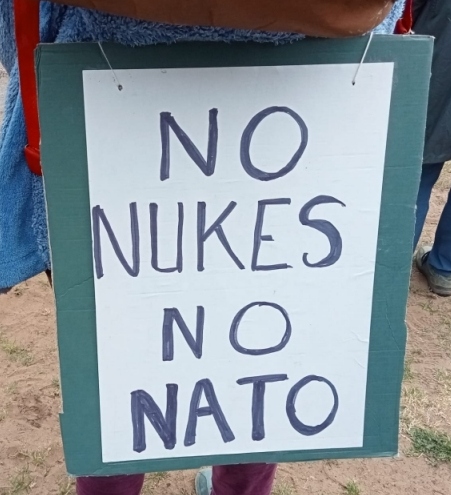 Speaking
at the rally in front of the base, Tom Unterrainer, CND Chair, said
that U.S. nuclear weapons are being brought to Britain with no
discussion in the Westminster Parliament, or any other institution. He
said that "when the government was asked to comment on these
developments the reply
was very clear as to who is calling the shots over these nuclear
weapons." It was the U.S. calling the shots in the relationship between
the United States government and the British government, the United
States military and the British military, because the answer from James
Heappy, the government
Under-Secretary of State for Defence, was that "the British government
does not comment on United States spending."
Speaking
at the rally in front of the base, Tom Unterrainer, CND Chair, said
that U.S. nuclear weapons are being brought to Britain with no
discussion in the Westminster Parliament, or any other institution. He
said that "when the government was asked to comment on these
developments the reply
was very clear as to who is calling the shots over these nuclear
weapons." It was the U.S. calling the shots in the relationship between
the United States government and the British government, the United
States military and the British military, because the answer from James
Heappy, the government
Under-Secretary of State for Defence, was that "the British government
does not comment on United States spending."
Tom Unterrainer continued that "never mind that the U.S. spending on this site at Lakenheath is part of a $380 million redevelopment of the nuclear storage sites across Europe." He said that the governments of states belonging to NATO "welcome these nuclear arms with open arms and keep their mouths shut when they are asked to account for their actions." He said that "this is why CND is opposing nuclear weapons and being very clear sighted about Britain's relationship with the United States and what that means in terms of what NATO represents as a military threat to us all."
He said, "We are not alone in facing these U.S. nuclear bombs; in Germany, Italy, the Netherlands, Belgium and Turkey similar arrangements are in place. In many of those places, just like here, high-tech fighter bomber aircraft are to be stationed, all the better for raining death, destruction and genocide on people's heads. And in all of these places they will soon be receiving new U.S. nuclear bombs."
He concluded that CND of course opposes all nuclear weapons wherever they are but in particular, "we oppose Britain's Trident weapons system and we also sharply oppose the alliances, the treaties, the secret arrangements and secret deals that mean that this country is tied to an international network of nuclear armed states." He said that CND must continue its work in dangerous times and "the return of nuclear bombs to Lakenheath must be resisted in an ongoing campaign."
As mentioned, the British government refuses to confirm or deny that U.S. nuclear weapons are to be stationed at Lakenheath as the base is classed as U.S. land over which the U.S. claims sovereignty on the soil of Britain. This in itself is outrageous. It makes Britain as criminal as is the United States in its warmongering, and tied to it.
It appears that both the U.S. and Britain are prepared to break the taboo on nuclear weapons and their use, and promote the thinking of the unthinkable. Their pretext is that, on evidence which is questionable, Russia is prepared to wage a first strike with tactical nuclear weapons. The U.S. and Britain also cite the Democratic People's Republic of Korea in this context.
It is vital that the anti-war movement stop Britain hosting the U.S. preparations for nuclear war on British soil with the nuclear bombers at Lakenheath and other bases in Britain, as a component part and escalation of opposing U.S./NATO aggression, of which Britain is an enthusiastic champion. There is also a vital necessity to stop Britain's warmongering role and its refusal to stand for peaceful solutions to conflicts in the world, whether in Ukraine, Somalia, Yemen or Palestine. The anti-war movement opposes Britain's role as the main ally of the U.S. and its drive to expand NATO to militarize Europe, Africa, Asia and the East Pacific.
Like the protests at Lakenheath, people all over the world demand an end to this participation in global warmongering and stand for peace. This is the nub of the matter.
Note
1. Stop U.S. Nukes Coming to Lakenheath!
(Report and Photos: Workers' Weekly)
Declaration of Peace Summit, Madrid 2022
Disband NATO. NATO is a grave threat to world peace, having already left a trail of destruction from Yugoslavia to Afghanistan.
NO TO NATO
- NATO must be disbanded. The alliance has no legitimacy and only sows despair.
- NATO pretends its parochial interests are universal. NATO violates the UN Charter and cynically uses concepts such as 'democracy' and 'human rights.' From its inception, NATO had authoritarian, fascist, and colonial regimes as part of its alliance.
- NATO threatens world peace. NATO-led military interventions have disrupted and destabilized Yugoslavia, Afghanistan, and Libya. Now, NATO escalates a 'new cold war' against China and Russia along the borders between Ukraine and Russia as well as in the Black Sea and the China Sea; NATO acts against progressive governments across the Global South.
- NATO drives the global arms race. NATO, whose members must spend at least two per cent of their GDP on the military, is responsible for more than half of global military spending and two-thirds of the global arms trade.
- NATO's nuclear agenda endangers our survival. NATO rejects the Treaty on the Prohibition of Nuclear Weapons and NATO's behaviour of sharing 'forward-deployed' U.S. nuclear weapons in the European Union contradicts the letter of the Non-Proliferation Treaty.
- NATO is one of the biggest climate polluters in the world. The U.S. military is the largest institutional polluter in the world, responsible for more greenhouse gas emissions than countries the size of Portugal (it insists on exempting military emissions from country-based reports). NATO operates as the police force of the biggest carbon polluting multinational corporations.
- NATO generates poverty and inequality. The arms race goes against the real needs of people -- education, health care, housing, social security, and a rational energy policy. Global war creates extreme suffering and the migration crisis.
Yes to Peace
- We need a non-military security system, without nuclear weapons, overseas military bases and a drastic reduction in military spending. We stand for an active peace policy, where conflicts end at a negotiation table based on the UN Charter.
- Invest in social progress, not war. What we need is a different concept of security. A common and human security that fulfills human needs and fights climate change, inequality, poverty and violence, and is based on solidarity, cooperation and mutual respect.
- Europe and North America must commit to disarmament. The concept of the Zone of Peace -- adopted by Latin America, Africa, South-East Asia, the South Pacific, and Central Asia -- must be endorsed by the European Union and the countries of North America.
March with Us Against NATO to Build a World of Peace.
To sign the declaration, click here.
News, Views and Information on Unfolding Events
International Headlines
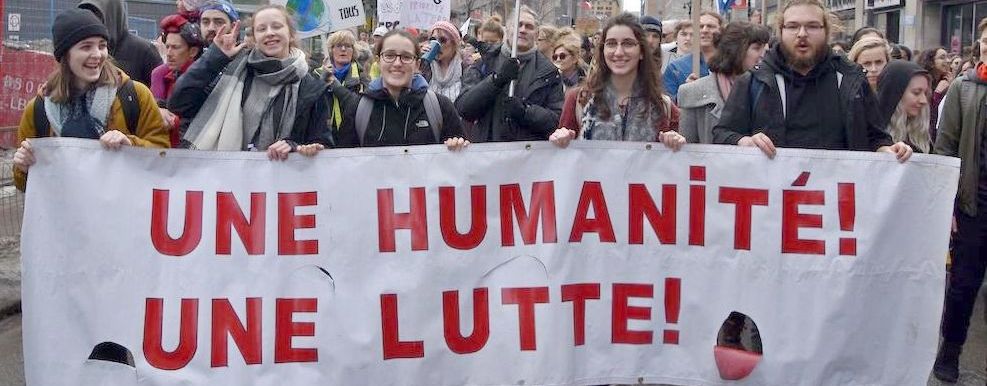
Britain Proposes New Alliance to Ukraine
Britain is reported to have proposed a new alliance with Ukraine, the newspaper Corriere Della Sera said. British Prime Minister Boris Johnson proposed to Ukrainian President Volodymyr Zelensky the creation of a new international alliance against Russia. The proposal is meant to unite countries "dissatisfied with the policy of Brussels and Germany's actions against Moscow" into a "new political, economic and military alliance" that will become an alternative to the European Union. This can only be seen as another attempt to circumvent the consequences of Britain leaving the European Union and sowing discord in its ranks.
According to the report, Johnson first suggested it while in Kiev on April 9. The "Johnson model," as it is being called, involves the creation of a European community led by Britain (the closest U.S. collaborator) and would include Ukraine, Poland, Estonia, Latvia and Lithuania. Turkey was also mentioned as a possible member.
Fractured European Unity Around NATO
In an article in the British newspaper The Telegraph, political commentator Douglas Murray distinguishes four camps within NATO, each with its own angle on how to resolve the Ukrainian crisis. The first, he says, is headed by Britain, since it was Britain who foresaw "Russian aggression" and provided Ukraine with support in a timely manner.
The second camp is headed by Germany, comprised of those Europeans who are "compromised by their recent agreements with the Russian Federation."
The third camp, which he calls "Elysian," puts France at the head. "There is the Elysian camp and there is a president who believes that if he maintains an open line with Putin, he can somehow resolve the conflict. It is clear that President Zelensky and others have lost patience with President Macron," Murray writes.
Murray calls the fourth camp the one led by the U.S., which "deliberately prolongs the conflict, seeking a change of power in the Russian Federation."
What to conclude from this? Oligopolies form coalitions and cartels according to their own narrow private interests and where they see they can be served even on a short-term basis. NATO is not so united as it seems at first glance. The peoples cannot afford to let these private interests run amok.
China Replies to U.S. Secretary of State
China rejected the Biden Administration's approach to the People's Republic of China (PRC) as put forward by U.S. Secretary of State Antony Blinken in a speech on May 26 at George Washington University. The speech followed Biden's provocation May 23 saying the U.S. would defend Taiwan militarily if China invaded -- something it has said it would not do. Blinken emphasized that the U.S. considers China a major "threat" and the most serious long-term challenge to the international order.
China's Foreign Ministry spokesperson Wang Wenbin told reporters that the U.S. only wanted to "contain and suppress China's development and uphold U.S. hegemony." He said Blinken spread false information, hyped the China "threat" and interfered in China's internal affairs, smearing China's domestic and foreign policy. He explained that U.S. undermining of the long-standing One-China policy, including promotion of "Taiwan independence" forces, puts peace and stability in the Taiwan Strait in serious jeopardy.
Wang said the U.S. is confusing right and wrong when it calls China "the most serious long-term challenge to the international order." "China was, is and will remain a defender of the international order. We uphold the UN-centered international system, the international order based on international law," he said. He added that the U.S. uses international rules when they suit its interests and abandons them otherwise.
Wang said humanity has "entered a new era of connectivity that closely links countries in their interests and destinies. The pursuit of peace, development and win-win development are an irresistible trend of the times." Continuing he said that "peace, development, equity, justice, democracy and freedom are the common values of humanity. Democracy and human rights have historical, specific and practical contexts. Countries can only explore suitable paths in light of national realities and people's needs. There is no one-size-fits-all model. No country has the right to monopolize the definition of democracy and human rights."
U.S. Congress Steps Up Interference in Africa
The law passed by the U.S. Congress on April 26, titled Countering Malign Russian Activities in Africa Act was signed into law by President Biden. The law targets and punishes African states that maintain political and economic relations with the Russian Federation. It is also a means to justify further U.S. military involvement in Africa, using AFRICOM. On May 16, Biden sent 500 U.S. troops into Somalia.
The Act says the U.S. will "hold accountable" Russia and African governments who are "complicit in aiding" what the U.S. decides is Russia's "malign influence." This is much like Bush's claim, "you are with us or against us," demanding that the U.S. decides who is and who is not a "terrorist." The Act is largely U.S. revenge against the many African nations that refrained from condemning Russia's military operation in Ukraine and did not support U.S. sanctions. As one anti-war activist put it, "This bill is a racist affront to the right to self-determination of African people."
Ukraine and Poland Sign String of Joint Projects
The governments of Ukraine and Poland signed a string of bilateral documents in the fields of defence, energy and regional development on June 1, the Ukrainian government press service Ukrinform reported. The agreements were reached during the intergovernmental consultations in Kyiv in the presence of Ukrainian Prime Minister Denys Shmyhal and his Polish counterpart Mateusz Morawiecki.
In particular, the two countries agreed to set up a joint commission that will prepare recommendations on the format of the Ukrainian-Polish joint venture for the manufacture of weapons and military equipment. "This will take our defence and military cooperation to a new level and allow us to create modern types of defence weapons," Shmyhal said. They also agreed to cooperate in the energy sector.
A joint declaration on cooperation at the level of border services and a document on developing Ukraine's communities as a part of the country's post-conflict recovery was also signed.
The next meeting of the two is scheduled for 2023 in Warsaw.
Denmark Joins European Union Defence for First Time in 30 Years
Denmark will now participate in European Union (EU) deliberations on defence topics and take part in EU military operations, the Danish Prime Minister announced. There was a major push by government officials and 11 of Denmark's 14 parties for a "yes" vote in a referendum on this issue, in the name of "security." The vote took place in the context of massive war hysteria and military buildup by the U.S. and NATO. According to Denmark's electoral authority, in the vote on whether to end, for the first time in 30 years, opting out of EU deliberations and military operations, 66.9 per cent voted in favour of ending Denmark's opt-out and 33.1 per cent against. Reports do not indicate what percentage of Danish voters participated in the referendum vote.
Swiss Government Vetoes Denmark's Request to Donate Swiss-Made Weapons to Ukraine
In related news on June 1, the Swiss government vetoed Denmark's request to donate Swiss-made Piranha III armoured personnel carriers to Ukraine. The Swiss State Secretariat for Economic Affairs rejected a request to send around 20 of the armoured vehicles to Ukraine.
According to the Swiss Radio and Television (SRF) report, "The Swiss Federal Council may shift its stance on the issue, with a number of MPs saying there is some leeway in the country's War Material Act. In their view, the legislation might allow Bern to permit other countries to re-export their weaponry to conflict zones under certain circumstances."
Others disagree. Jean-Marc Rickli, head of Global and Emerging Risks at the Geneva Centre for Security Policy, says that given Switzerland's neutrality, "agreeing on the export would be a violation of international law as well as Swiss domestic law."
On the same basis, Switzerland previously vetoed the provision of Swiss-made ammunition used in German Gepard anti-aircraft tanks sent to Ukraine. Nonetheless, SRF says, "pressure on Switzerland to show flexibility on the issue has been mounting for some time." The same U.S./NATO pressure and blackmail on Finland and Sweden's own war profiteers are getting them to abandon their long-standing neutrality and seek to join NATO.
European Union Pledges Ukraine More Funds for Military
and Reconstruction
European Commission President Ursula von der Leyen on May 18 proposed an aid package of 9 billion euros (U.S.$9.5 billion) to keep Ukraine's government running. The announcement must still be approved by both the European Parliament and European Council which have already previously approved four consecutive 500 million euro (U.S.$520 million) packages of military aid and 1.2 billion euros (U.S.$1.26 billion) worth of emergency loans.
 Von
der Leyen also said that the EU would lead reconstruction efforts in
Ukraine after hostilities cease but would not be the sole contributor.
"That is why we propose a reconstruction platform as part of this plan
jointly led by Ukraine and the Commission and bringing together EU
Member States,
other bilateral or international donors, international financial
institutions, and other like-minded partners," she said.
Von
der Leyen also said that the EU would lead reconstruction efforts in
Ukraine after hostilities cease but would not be the sole contributor.
"That is why we propose a reconstruction platform as part of this plan
jointly led by Ukraine and the Commission and bringing together EU
Member States,
other bilateral or international donors, international financial
institutions, and other like-minded partners," she said.
Her announcement came in response to the U.S. demand that Europe fund Ukraine. U.S. Treasury Secretary Janet Yellen told the Brussels Economic Forum that "the bilateral and multilateral support announced so far will not be sufficient to address Ukraine's needs, even in the short term."
Ukrainian President Volodymyr Zelensky has claimed that Ukraine needs around $7 billion per month to pay its soldiers, civilians and pensioners, and to keep essential services running. The proposed EU package will therefore keep Ukraine functioning for just over a month.
Money for the aid package would be borrowed by the European Commission in global financial markets and would be repayable by Kyiv, news agencies inform. As per the EU's rules on macro-financial assistance, the Ukrainian government would be free to use the cash as it sees fit.
Differences in European Union Over Banning Russian Oil Imports
Meanwhile, news reports continue to inform that the 27-member European Union is not united over the question of banning Russian oil imports. Hungary, Slovakia, Cyprus, Greece, Malta and others are seriously concerned about the impact on their economies. Cyprus, Greece and Malta have the largest shipping fleets within the EU and say they would be seriously affected by bans on the import of Russian oil and related sanctions.
More U.S. Pressure on Oil Producing Countries
The U.S. also continued to put pressure on countries which belong to the Organization of Petroleum Exporting Countries (OPEC). News reports say the U.S. has been having problems securing the cooperation of OPEC-member countries for its efforts to blockade Russian oil and gas exports, and replace them by having other OPEC members increase production.
Towards that aim, an anti-OPEC bill was introduced in the U.S. Congress which would give powers to U.S. prosecutors to sue organizations for perceived anti-competitive actions in the oil markets. Similar legislation was passed by Congress in 2007 but was vetoed by George W. Bush because it would have led to the disruption of oil supply as well as "retaliatory action against U.S. interests," news agencies say. OPEC "has refused to change its output plans -- despite U.S. pressure to bring it in line with U.S. efforts to sanction/blockade Russian oil exports," they add.
German Supply of Weapons for Ukraine Faces Legal Hurdles
Reports inform that in Germany parliamentarians expressed concerns about Germany supplying howitzers and instructing Ukrainian soldiers in their use, thus becoming a party to the war in Ukraine. Legal opinions had to be presented to the German government on this matter. All of it underscores how post World War II arrangements are being broken behind the backs of the European peoples which, when it comes to sending German troops and military materiel abroad, is of serious concern.
Austrians Express Opposition to NATO Membership
Recent polls in Austria reveal that the people of Austria are overwhelmingly opposed to their country joining NATO, news agencies inform. About 75 per cent of respondents to a poll disagreed with joining NATO and only 14 per cent supported the idea.
Worrisome Statements About the Future of a Militarized Europe
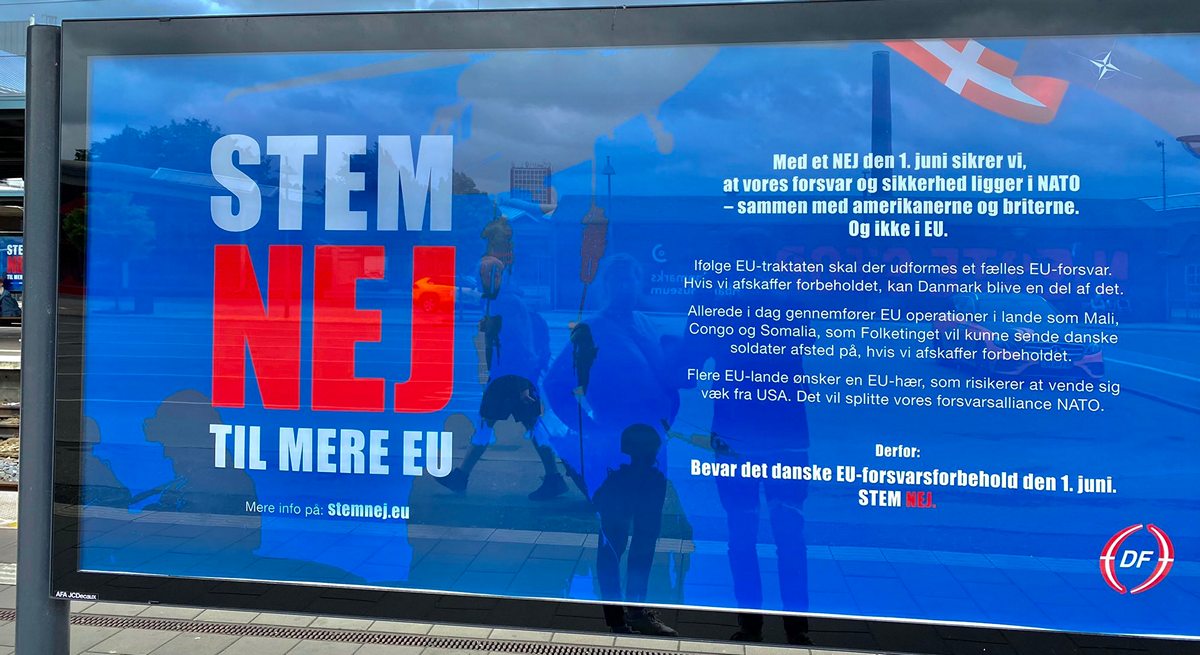 Sign
for a No vote in June 1, 2022 referendum on whether to end Denmark's
non-participation in European defence. The Yes vote won, reversing the
policy.
Sign
for a No vote in June 1, 2022 referendum on whether to end Denmark's
non-participation in European defence. The Yes vote won, reversing the
policy.
While Denmark has reversed its policy on non-participation in European Union defence affairs, member states of the EU are "ready to take European defence innovation to the next level, in cooperation with the European Commission but also with NATO," Jiri Sedivy, chief executive for the European Defence Agency (EDA), said at the EU's first "Defence Innovation Day." Josep Borrell, head of the EDA, who is supposed to be a diplomat, has already declared that only a military solution is an option for Ukraine.
Like NATO, the EU does not have its own armed forces. NATO member countries decide whether and how many of their own forces to send into U.S./NATO-provoked conflicts. Establishing such an army for the EU could well be the "next level," while also serving to possibly contend with U.S. dictate and military command over Europe. It is also aimed at current U.S./NATO efforts to weaken Russia.
Russian Foreign Minister Sergey Lavrov responded to this at a news conference following a visit to Saudi Arabia.
"There really is such a strong Russophobic wing in the European Union, which for many years effectively imposed its position on everyone else, exploiting the principle of solidarity and consensus," he said. This wing, "is now stepping up its activity," Lavrov said.
"Borrell's statements, despite the impropriety of the belligerent words coming from the mouth of the top diplomat of the European Union, reflect the trend that an aggressive minority is imposing on the entire European Union," Lavrov said. The ideal for this minority is "a militarized European Union as an appendage of NATO," he said.
Lavrov also described German Chancellor Olaf Scholz's statements about Germany's intention to become the main EU military force as evidence of resurgent "dominant aspirations" in the country.
"We have taken note of the statement by German Chancellor Olaf Scholz who stated that Germany would become the main military force in the European Union," Lavrov said. "I have already read feedback by observers who said they were seriously bewildered that such statements were made by the German leader."
"This evokes some thoughts because this is far from being the sole evidence of the resurgence of dominant aspirations in Germany," Russia's Foreign Minister said. Such statements "must be heard by other EU members and must become a subject of a serious talk," he said. He said what is called for is "talk about how Europe will develop further and how it will continue to draw lessons from its hard history of past centuries."
Seventh International Russia-China Conference Discusses "Cooperation in a New Era"
The 7th International Conference between Russia and China took place on June 1. Minister of Foreign Affairs of the Russian Federation Sergey Lavrov, in a video address to the Conference, said:
"It is a well-known fact that the word 'crisis' in Chinese is a combination of two characters: 'danger' and 'opportunity.' I am sure that the hybrid war unleashed by the collective West against Russia opens up new opportunities for expanding Russian-Chinese practical cooperation, including in investment and finance."
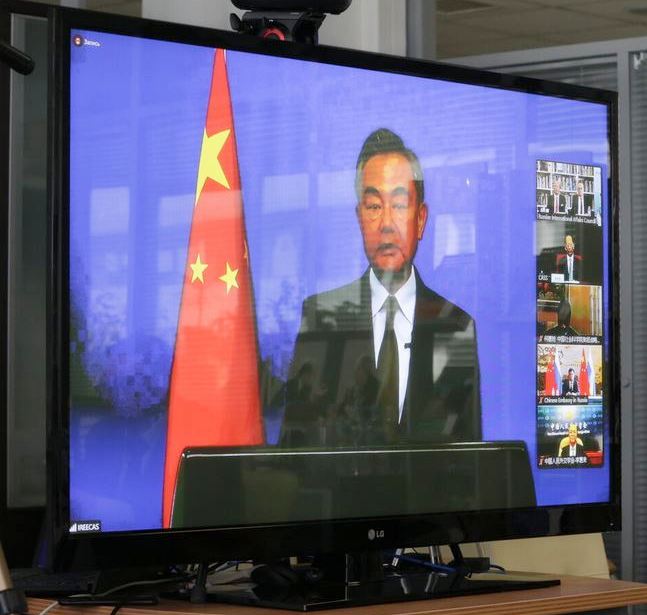
Lavrov pointed out that in the difficult and crucial time the world is going through today, the comprehensive development of the strategic partnership with the People's Republic of China remains among the priorities of Russia's foreign policy. "President Vladimir Putin has described the relations between Moscow and Beijing as 'a model of efficiency, responsibility and aspiration for the future.' The experience of joint work under the new conditions shows that our ties have a powerful and truly inexhaustible potential, confidently passing the strength test," he emphasized. "Despite the sanctions pressure and information war from the U.S. and its satellites, we were able to not only maintain the entire range of bilateral cooperation, but also saturate it with a relevant substantive agenda. New formats and areas of joint efforts are being created. The scale and intensity of such cooperation will grow."
Lavrov is convinced that the prosperous future of the peoples of Russia and China and, to some extent, the outline of a more just and democratic polycentric world order being shaped, will depend on how effectively the two nations will be able to achieve their objectives.
Lavrov noted that the strategic vector of joint efforts between the two countries is formed primarily as a result of the dialogue of trust at the highest level. He reiterated that on February 4 the Russian president paid a historic visit to Beijing where he held the first face-to-face talks with his Chinese counterpart Xi Jinping since the outbreak of the pandemic and adopted a significant political document titled Joint Statement on the International Relations Entering a New Era and the Global Sustainable Development.
"It enshrines common positions on the issues of international security, the democratic process, human rights and sustainable development. I would like to emphasize its provision, which was successfully formulated earlier by my esteemed colleague and friend Foreign Minister Wang Yi: there are no restrictions and prohibited topics in our cooperation," Lavrov added.
Foreign Minister Lavrov stressed that China has long been Russia's main foreign trade partner. "Our economies successfully complement each other. Last year, bilateral trade turnover grew by a third and reached a historical maximum, exceeding $140 billion. Serious positive dynamics are still observed today," he noted.
"Russia and China are systematically implementing all approved cooperation programs. The energy partnership has acquired a strategic character. Large projects in industry, agriculture and transport are being implemented. The construction of road and railroad bridges across the Amur River is completed. Traffic will start soon," Lavrov stressed.
U.S. Sanctions Will Force Russia into Default on Foreign Debt Held Mostly by U.S. Investors
The U.S. is becoming increasingly irrational. It is now lashing out at Russia for daring to defy its global hegemony. The trade and financial sanctions it has imposed on Russia are spreading economic disruption throughout the world including even in the United States.
The U.S. Treasury Department's Office of Foreign Assets Control scrapped a temporary exemption on Russia's debt payments when it expired on May 25. The waiver allowed Russia to keep up government debt payments to those within the control of the U.S., which accounts for about $40 billion of its international bonds.
The extra-territorial nature of U.S. financial sanctions on Russia means that any bank or other institution having any dealings or holdings within the U.S. itself or with U.S. institutions anywhere in the world must abide by the sanctions or be punished with fines and other actions. This has angered many investors in Russian debt even those within the U.S. sphere of control.
Despite the U.S., UK and EU freezing over $300 billion of Russia's foreign currency reserves, Russia has so far managed to service all its debts and is organizing alternate ways to continue to do so with those who are willing. A $490 million foreign-currency bond payment is due at the end of June and a further $1.5 billion by the end of the year. "The 24th June bond is paid offshore and so without (the U.S. Treasury) General License 9C will presumably not be able to be made," wrote Jonny Goulden at JPMorgan.
Russian authorities say they will definitely pay all those who are not directly ensnared within the sanctions imposed by U.S.-controlled states and their financial institutions. Many in Europe are seeking exemptions to avoid the self-imposed crisis of a technical default on the Russian debt and restrictions on trade. Others including the BRICS grouping of countries (Brazil, Russia, India, China, South Africa) have already fashioned alternate international payment systems to the U.S.-controlled institutions such as SWIFT.
Scrapping the exemption on servicing Russia's debt has put a block on debt-servicing payments going to U.S. investors. Russian Finance Minister Anton Siluanov said the country will service its external debt obligations in Russian rubles if the United States blocks other options. The country will not declare itself in default. Whether those in control allow the debt to be serviced in rubles is their decision but Russia will not consider itself in default and will continue normal financial dealings with friendly countries, the Finance Minister said. Most countries and investors have said they will view a technical default of Russia's foreign debt as "artificial" with some even suggesting it would look more like a real default of the U.S.-dominated global financial system.
"The Russian economy is already under heavy sanctions, so the immediate consequences of the default will probably mean not much to the economy," said Alexey Bulgakov of Renaissance Capital. This comment from one of the world's largest investment cartels reveals the weakening of U.S. global hegemony.
According to Bloomberg, some friction has emerged within the U.S. ruling elite, with certain Treasury officials insisting that Russia should be allowed to pay its debt as failure to do so would largely fall on U.S. investors -- a classic example of cutting off your nose to spite your face. In response to the rumblings of discontent, U.S. Treasury Secretary Janet Yellen is reported to have said that the Treasury Department was still "analyzing the potential consequences of the decision."
Russia has made all its scheduled payments to creditors since the U.S.-imposed sanctions began, with Russian officials repeatedly stating the country is well-equipped to continue doing so. Russia's total foreign debt was only $65 billion as of December 2021 with government debt at about $250 billion, which is small by international standards. In comparison the U.S. public/government debt in 2018 was around $16 trillion and intragovernmental debt another $5.7 trillion. Foreign governments and institutions held around $7 trillion of the U.S. government debt. Total annual servicing charges on U.S. government debt is approaching half a trillion dollars with around 37 per cent going abroad.[1]
According to Russia's central bank, total exports reached $489.8 billion last year. Of that, crude oil accounted for $110.2 billion, oil products $68.7 billion, pipeline natural gas $54.2 billion and liquefied natural gas $7.6 billion. Return on exports will likely firm or even increase as prices for energy, grain, fertilizer, minerals and other commodities Russia sells in abundance have continued to climb, mainly because of U.S./UK/EU sanctions on Russia's trading relations. Most countries outside the U.S./NATO military bloc and even some inside are defying the sanctions. Russia is finding buyers for its exports in Asia, Africa, South America and elsewhere to replace those from what it calls "unfriendly countries" engaged in economic and proxy warfare against it.
Note
1. As of August 31, 2020, federal U.S. debt held by the public was $20.83 trillion and intragovernmental holdings were $5.88 trillion, for a total national debt of $26.70 trillion. At the end of 2020, debt held by the public was approximately 99.3 per cent of annual GDP, and approximately 37 per cent of this public debt was owned by foreigners. The total number of U.S. Treasury securities held by foreign countries in June 2020 was $7.04 trillion; of this $4.1 trillion (59.2 per cent) belonged to foreign governments and $2.8 trillion (40.8 per cent) to foreign investors.
Including both private and public debt holders, the top three December 2020 national holders of U.S. public debt are Japan ($1.2 trillion or 17.7 per cent), China ($1.1 trillion or 15.2 per cent), and the United Kingdom ($0.4 trillion or 6.2 per cent).
As of February 2022, total U.S. federal Government debt breached the $30 trillion mark for the first time in its history. (From Wikipedia)
What the
U.S. and NATO Are Doing
Violates International Law
The U.S. and NATO member countries justify sending armaments and specialist forces into the civil crisis in Ukraine and the expansion of NATO to the former Soviet bloc countries of Eastern Europe and now northern Europe as upholding "core principles" of international order such as Ukraine's sovereignty and "the right of states to choose their own security arrangements and alliances."
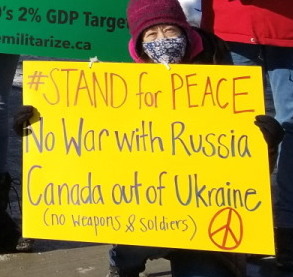 This
is a prime example of the U.S., at the head of its aggressive NATO
military alliance, dictating rules of international order in utter
disregard for international law. Their so-called "core principles" of
"the right of states to choose" stand in utter violation of existing
treaties whose
overriding principle is that all member states to these agreements
should "not strengthen their security at the expense of the security of
other states."
This
is a prime example of the U.S., at the head of its aggressive NATO
military alliance, dictating rules of international order in utter
disregard for international law. Their so-called "core principles" of
"the right of states to choose" stand in utter violation of existing
treaties whose
overriding principle is that all member states to these agreements
should "not strengthen their security at the expense of the security of
other states."
There is international law on such matters. For example, Principle VI of the Principles of International Law Recognized in the Charter of the Nuremberg Tribunal and in the Judgment of the Tribunal, 1950 states:
"The crimes hereinafter set out are punishable as crimes under international law:
(a) Crimes against peace:
(i) Planning, preparation, initiation or waging of a war of aggression or a war in violation of international treaties, agreements or assurances;
(ii) Participation in a common plan or conspiracy for the accomplishment of any of the acts mentioned under (i)."
There is plenty of evidence that the U.S. and NATO member states gave verbal and written assurances that NATO would never threaten Russian security by expanding into the former Soviet bloc countries of Eastern Europe. Today the U.S. and NATO members deny any such assurances were given.
But the U.S. and NATO members, Canada included, cannot so easily escape their obligations under several treaties and agreements they have signed in the context of providing all the signatories security guarantees. With these phrases about "core principles" and "the right of states to choose their own security arrangements and alliances" the U.S. seeks to impose a rules-based order where the U.S. decides what the rules are, without regard to international law.
 Expanding
NATO membership into former Soviet bloc countries and now northern
Europe and threatening the security of Russia are in violation of
numerous treaties. The 1975 Helsinki Final Act; the 1990 Charter of
Paris for a New Europe; and the 1994 Conference on Security and Co-operation in Europe
(now the Organization for Security and Cooperation in Europe (OSCE)) Code of
Conduct on Politico-Military Aspects of Security are three such
treaties.
Expanding
NATO membership into former Soviet bloc countries and now northern
Europe and threatening the security of Russia are in violation of
numerous treaties. The 1975 Helsinki Final Act; the 1990 Charter of
Paris for a New Europe; and the 1994 Conference on Security and Co-operation in Europe
(now the Organization for Security and Cooperation in Europe (OSCE)) Code of
Conduct on Politico-Military Aspects of Security are three such
treaties.
An article entitled "Equal Right to Security," published by German-Foreign-Policy.com on January 18 points out that while these treaties do "recognize the freedom of states to choose their own security arrangements," they also oblige European states to choose security arrangements, such as joining a military alliance, "not at the expense of the security of other states."
The article notes, "Over the past few days and weeks, it has, at times, been pointed out that in its paragraph 8, the Charter [for European Security] reaffirms 'the inherent right of each and every participating state to be free to choose or change its security arrangements, including treaties of alliance.' However, it was systematically ignored that the same paragraph stipulates that 'each participating state will respect the rights of all others in these regards,' and that 'each participating state has an equal right to security.' Thus, the Charter for European Security stipulates that the participating states shall 'not strengthen their security at the expense of the security of other states.' No one -- including the West -- shall claim pre-eminence: 'Within the OSCE no state, group of states or organization can have any pre-eminent responsibility for maintaining peace and stability in the OSCE area or can consider any part of the OSCE area as its sphere of influence.' Paragraph 9 states that 'the security of each participating state is inseparably linked to that of all others.'"
The OSCE is the world's largest regional security organization with 57 states from Europe, Central Asia and North America. Canada is a member and participates in formal and informal OSCE meetings, including the weekly meetings of the OSCE's Permanent Council and Forum for Security Co-operation.
Russian Foreign Minister Lavrov gave an interview on January 14 in which he said: "Conflict potential is building up, and our Western colleagues have largely shaped this trend. Their policy consists of undermining the architecture of international relations based on the UN Charter, as well as replacing international law with their own 'rules' and imposing them on others to build a new world order. [...] Those refusing to join these initiatives are labeled as reactionary countries seeking to impose a revisionist agenda in international affairs. However, it is the West that currently promotes a revisionist agenda. It is the West that seeks to revise the UN Charter. Russia and other nations who are our allies and strategic partners have been standing up for the UN Charter, its principles, purposes and structure to defend them from revisionist aspirations."
Lavrov said "the Western reaction has consisted primarily of a categorical rejection of ending NATO's open door policy. But Russia is not bound by any agreements within NATO. We, the Americans, Europeans, NATO members, and neutral states, are firmly bound by agreements and political commitments within the OSCE framework. In this context, OSCE provides us with a legal framework solely because in the 1990s, an agreement was reached to the effect that undermining indivisible European security and strengthening one's own security at the expense of others is unacceptable. [...] There is a special stipulation that no single state, group of countries or organization can be primarily responsible for the maintenance of peace and stability in the Euro-Atlantic region and cannot view any part of it as a sphere of its influence." Everyone shared these agreements and signed off on them, he said.
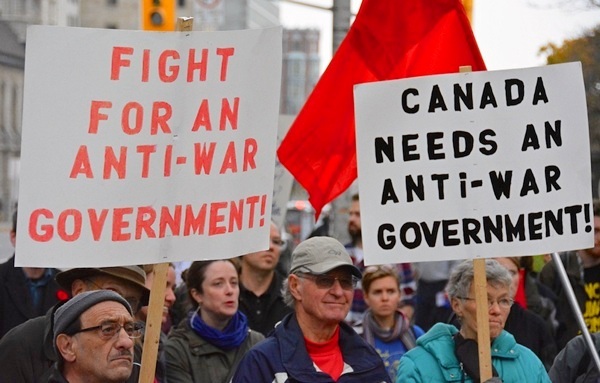 Canada
signed off on the OSCE accords too. All the war hysteria, creating of
tensions, fanning civil conflict in Ukraine, military exercises, rapid
deployment forces for military action which targets Russia, etc. are
flagrant violations of the commitments of all OSCE member countries. It
is also
flagrant violation of international law, including Principle VI found
in the Principles of International Law Recognized in the Charter of the Nuremberg
Tribunal and in the Judgment of the Tribunal, 1950.
Canada
signed off on the OSCE accords too. All the war hysteria, creating of
tensions, fanning civil conflict in Ukraine, military exercises, rapid
deployment forces for military action which targets Russia, etc. are
flagrant violations of the commitments of all OSCE member countries. It
is also
flagrant violation of international law, including Principle VI found
in the Principles of International Law Recognized in the Charter of the Nuremberg
Tribunal and in the Judgment of the Tribunal, 1950.
Canada must stop, change direction and uphold its OSCE commitments and the rule of international law. Those responsible for the violations must be held to account!
The Treaty
on Security Guarantees that
Russia Proposed to the U.S.
In December 2021, Russia proposed a draft treaty to the United States and a similar one to NATO, as a way of reaching security guarantees for both parties. Russia made its proposal public to bring the U.S. to the bargaining table.
The preamble of the draft treaty cites principles and articles of no fewer than nine existing treaties which the U.S. is already a party to, including the principles of the Charter of the United Nations, as precedents to the operative articles proposed.
U.S. actions to heighten tensions in Europe, war exercises of unprecedented scale by U.S. and NATO forces, forward placement of rapid deployment forces and sending lethal weapons to Ukraine which end up in the hands of neo-Nazi forces are all in flagrant violation of these treaties and the rule of law.
Below are the operative articles of the draft treaty as posted by the Foreign Ministry of Russia. The written response provided by the U.S. on January 26, according to Russian President Vladimir Putin, ignored all "fundamental Russian concerns."
Article 1. The Parties shall cooperate on the basis of principles of indivisible, equal and undiminished security and to these ends:
i) shall not undertake actions nor participate in or support activities that affect the security of the other Party;
ii) shall not implement security measures adopted by each Party individually or in the framework of an international organization, military alliance or coalition that could undermine core security interests of the other Party.
Article 2. The Parties shall seek to ensure that all international organizations, military alliances and coalitions in which at least one of the Parties is taking part adhere to the principles contained in the Charter of the United Nations.
Article 3. The Parties shall not use the territories of other States with a view to preparing or carrying out an armed attack against the other Party or other actions affecting core security interests of the other Party.
Article 4. The United States of America shall undertake to prevent further eastward expansion of the North Atlantic Treaty Organization and deny accession to the Alliance to the States of the former Union of Soviet Socialist Republics.
The United States of America shall not establish military bases in the territory of the States of the former Union of Soviet Socialist Republics that are not members of the North Atlantic Treaty Organization, use their infrastructure for any military activities or develop bilateral military cooperation with them.
Article 5. The Parties shall refrain from deploying their armed forces and armaments, including in the framework of international organizations, military alliances or coalitions, in the areas where such deployment could be perceived by the other Party as a threat to its national security, with the exception of such deployment within the national territories of the Parties.
The Parties shall refrain from flying heavy bombers equipped for nuclear or non-nuclear armaments or deploying surface warships of any type, including in the framework of international organizations, military alliances or coalitions, in the areas outside national airspace and national territorial waters respectively, from where they can attack targets in the territory of the other Party.
The Parties shall maintain dialogue and cooperate to improve mechanisms to prevent dangerous military activities on and over the high seas, including agreeing on the maximum approach distance between warships and aircraft.
Article 6. The Parties shall undertake not to deploy ground-launched intermediate-range and shorter-range missiles outside their national territories, as well as in the areas of their national territories, from which such weapons can attack targets in the national territory of the other Party.
Article 7. The Parties shall refrain from deploying nuclear weapons outside their national territories and return such weapons already deployed outside their national territories at the time of the entry into force of the Treaty to their national territories. The Parties shall eliminate all existing infrastructure for deployment of nuclear weapons outside their national territories.
The Parties shall not train military and civilian personnel from non-nuclear countries to use nuclear weapons. The Parties shall not conduct exercises or training for general-purpose forces that include scenarios involving the use of nuclear weapons.
Article 8. The Treaty shall enter into force from the date of receipt of the last written notification on the completion by the Parties of their domestic procedures necessary for its entry into force.
U.S. Response
On January 26, the U.S. provided written responses to Russia regarding its proposals for binding security arrangements. NATO did the same to similar proposals made by Russia in a separate document.
At a press briefing making the announcement, Secretary of State Antony Blinken said the U.S. position again makes clear "that there are core principles that we are committed to uphold and defend -- including Ukraine's sovereignty and territorial integrity and the right of states to choose their own security arrangements and alliances."
He didn't say these so-called "core principles" such as "the right of states to choose their own security arrangements and alliances" are cherry-picked out of context from existing treaties whose overriding principle is that all states that are party to these agreements should "not strengthen their security at the expense of the security of other states." Both the U.S. and NATO disregard the essence of these treaties while painting Russia as the aggressor.
Blinken would not make public the details of the response issued on January 26. He made some general statements about a willingness to discuss military "force posture" in Ukraine and give assurances about U.S. and NATO military exercises in Europe. He also said he saw potential for discussing missile arms control in Europe. But, unlike Russia, the U.S. did not make its positions public.
"We're not releasing the document publicly" Secretary Blinken said "because we think that diplomacy has the best chance to succeed if we provide space for confidential talks. We hope and expect that Russia will have the same view and will take our proposals seriously."
Russian Foreign Minister Sergey Lavrov has confirmed that Russia won't publish a U.S. response on security guarantees, but will disclose the general meaning of the replies.
(With files from U.S. State Department, TASS)
(To access articles individually click on the black headline.)
Website: www.cpcml.ca Email: editor@cpcml.ca

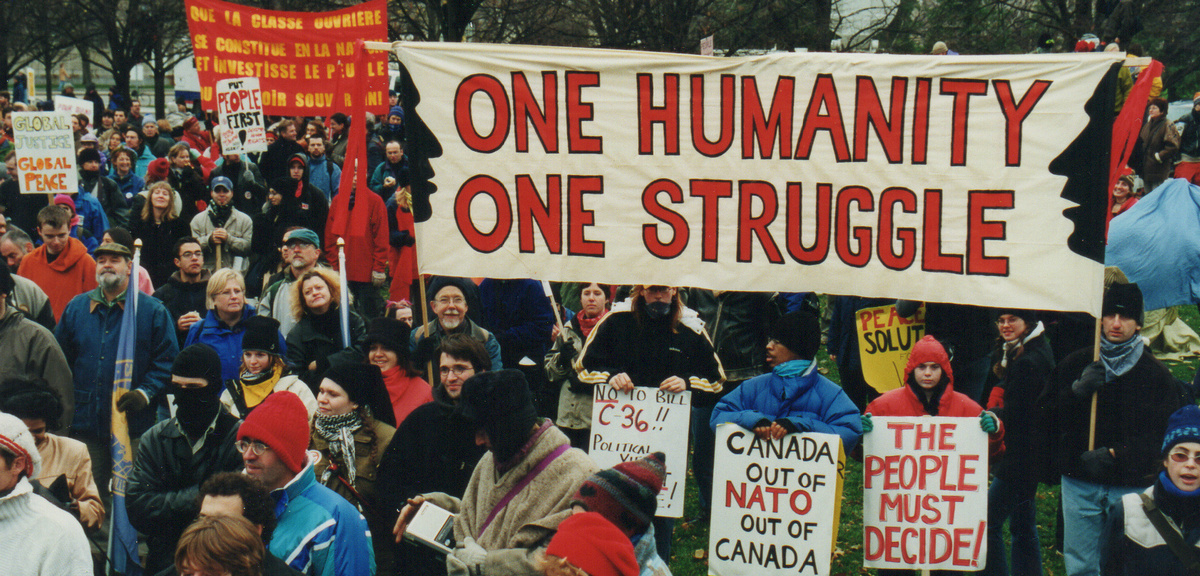

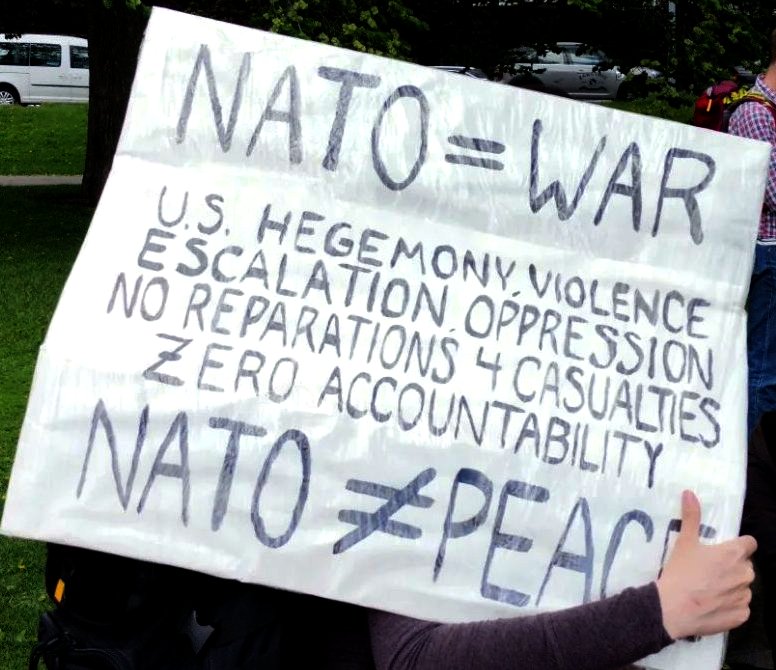 Finland,
anti-NATO protest, June 4, 2022.
Finland,
anti-NATO protest, June 4, 2022. 